#that's just a one-note 'damsel in distress' trope but as the protagonist
Text
Is it just me or has fandom overall...changed a lot in how it talks about its favourite characters over the past few years?
It used to be people who really liked a character would be like “this character’s the best at everything, they can do no wrong, they’d win every fight, they have a plan for everything, they’re the coolest cleverest most attractive person in the whole story!!!”, and like...that could go too far, it could be annoying or just really really inaccurate compared to canon (I used to know a Jill fan who insisted that Jill could easily beat every single character in the series in a fight--and look, Jill is very cool, but Chris was canonically the best in hand-to-hand combat at STARS and was also training HER in marksmanship, Jill is of course extremely capable but...she really does not have to be the best at everything to prove why she’s your favourite...for that matter, Wesker fans who were like “Wesker in RE5 has to be a clone/a fake/whatever because the REAL Wesker would never LOSE because Wesker can’t make mistakes!”...always made me go *stop, please, it’s embarrassing*), but it did...make sense why someone who really loved a character would say these things about them?
But now it seems like the kind of comments people make about their favourite characters, and the way they portray them in fics, are...pretty much the opposite of that? People will be like “my blorbo is SO STUPID! they’re so useless they can’t do ANYTHING! they’re a pathetic weak little wet paper bag!”
Like, a few years ago if I’d seen a post saying things like that about a character I’d assume it was written by someone who hated them?
And obviously...sometimes a character you love is kind of a dork, or makes some silly mistakes sometimes. Other times a character you love is a terrible evil person. I’m not saying everyone should equate liking a character with thinking they’re perfect. But...most popular characters AREN’T actually completely stupid and incompetent at absolutely everything, and I can never quite get my head around it when people seem to hold this view of a character and it’s clearly not true, like...if you really think they’re pathetic, stupid, and can’t do anything right...do you really like them that much?
I’ve seen fandom call characters stupid/idiots when they are either science geniuses, or they’re brilliant inventors who build sci-fi gadgets, or they’re scheming chessmaster strategist types who manipulate all the other characters for years and come very close to taking over the world, or maybe they just canonically speak several languages and are well-read, or even if canon doesn’t focus much on their intelligence you’ve got characters like Chris who was a USAF fighter pilot--which means he has a degree, judging by the timeline probably an Air Force Academy one, which means he was likely in the top 3% of his high school classes and DEFINITELY didn’t “barely scrape through” as I often see headcanoned (not just by people who want to bash him but people who are like “I love him! He’s such a big dumb himbo! He’s so stupid!!” like. what.)
Similarly I see characters who are canonically very confident and self-assured, never really doubting themselves for a second, and who canonically react to things going wrong by calmly adapting their plans and moving forwards without ever getting discouraged, get tagged on posts about “pathetic wet paper bag men who’ve never had a good day in their life and an insult from a child would make them cry”.
Or characters who are shown in canon as dangerous, powerful and near-fearless fighters get written in fics, by people who say they’re their favourites, as spending all their time crying and flinching and not even trying to defend themself from whoever’s attacking/trying to hurt them (and not because they went through some major trauma previously in the fic that left them in this state, either--often the fic is set during canon and the character is just...like that rather than something having happened to change them from who they were at that point in their life in canon)... personally, while I enjoy whump, whumping a character who’s ALREADY weak and helpless and spends all their time curled up in a corner crying BEFORE whatever you do to them in the fic can easily just feel like kicking them while they’re down and is honestly boring because it doesn’t show anything NEW about the character, so it’s particularly odd to see fics written that way when the character in canon is exactly the confident powerful type that I do think is fun to whump.
(For a specific example, RE canon is that Wesker and Sergei had a rivalry and Wesker seems to view Sergei mostly with disdain and see him as an annoying obstacle. Wesker never gives any sign of being scared of or intimidated by Sergei, and certainly doesn’t seem to start panicking the instant Sergei enters a room. And even before he had his powers, he had extensive combat training by the time he met Sergei, and Sergei being taller and heavier doesn’t inherently mean that Wesker would be defenceless and go down in one punch in a fight, or even that Wesker would LOSE a fight against him. Canon doesn’t depict Wesker as a helpless victim for Sergei to beat up...hurt him by all means but it’s OOC if Wesker doesn’t give as good as he gets.)
Oh, and characters who are canonically master manipulators who are experts at getting people on their side and gaining their trust being portrayed as so socially awkward and clueless that they’re incapable of holding a conversation without coming across offputtingly weird...
Maybe I’m the odd one out here but I can’t really get why you’d want to present your favourite character as LESS capable, LESS intelligent, LESS brave or confident or powerful or whatever other impressive traits they might have in canon? Like I wouldn’t go so far as to say I ADMIRE all my favourite characters, because some of them are murderous evil monsters, but...I generally do see them as either having some kind of admirable personality trait (courage, integrity, confidence, determination... or maybe just a lot of charisma and a good sense of humour, though I feel like charisma tends to overlap with confidence a fair bit...), or at least as being very good at what they do. I can kind of get the appeal of the “sweet and kind and caring but not that bright ‘golden retriever man’ type”, even though they’re not usually MY type, because I know some people primarily like characters who they think it would be good to be friends with (and most of those types of characters aren’t USELESS, at the very least they tend to be good at listening and being supportive), but when someone’s favourite character is a bad person AND they seem to think they’re stupid, useless, incompetent and pathetic on top of being evil it’s like...so what do you even like about them?
#I can even enjoy seeing a character at their lowest saddest point#but there has to be some contrast#otherwise it's just one-note#'sad' on its own is not a trait that will usually make me want to spend time with a character#if a character does nothing but mope about and feel sorry for themself throughout the story and never tries to improve their situation...#that's just a one-note 'damsel in distress' trope but as the protagonist#and it also just gets really monotonous#and I also just don't want a character who is always miserable existing in my head all the time#of course there are great and interesting characters who struggle with clinical depression#but there are ways of writing that#without making your character essentially replaceable with a wet tea towel with a sad face drawn on it#who gets bounced around the plot like a pinball#that's just a Sexy Lamp but replace 'sexy' with 'sad'#and while the Sexy Lamp test is meant to be about whether female characters are written as flat characters out of sexism#a flat useless male character might not be sexist but he certainly is boring#if all I know about them is 'they're sad and weak' that doesn't motivate me to want to spend time with them...#even 'they're an awful person but they're fun' is much more appealing than that
9 notes
·
View notes
Text
Tropes Masterlist
Hey! It's your girl, @thecomfywriter, back with another post. I'm going to keep the intro short for the sake of convenience, but here's the promised list of writing tropes , organized by genre. Also, don’t forget to check out my socials, and if you like my posts, support me with a coffee! Enjoy!
༺ ༻
Socials:
Insta:
Writing: @tovwriter
Art: @gkmarts
Pinterest: @gkm075
Wattpad: @gkm075
Tumblr: @thecomfywriter
BuyMeACoffee: https://www.buymeacoffee.com/nvna
༺ ༻
Romance:
Boy/girl next door
Bad boy x nerd/good girl
"You're just, not like other girls" (*gag* Ә)
Makeover scene
*character A takes character B to their secret "special spot"*
Love triangles
Enemies to lovers
Best friends to lovers
Star-crossed lovers •
Unrequited love (highkey love this one lol)
Character A is so logical and sciencey that they don't believe in something so unquantifiable as love until character
B, the artistic and emotional one, shows them what it's about
Fake dating
Forced marriage/alliance
Opposites attract
Instant love
Billionaire fantasy
Alpha x rebellious defiant ("strong independent woman" vibes)
Supernatural x human
Virgin x player
Reincarnated lovers who must find each other to stop the cycle
Mystery // Crime:
Dark past
Murder for secrets
“It was *insert ordinary unsuspecting random-ass character* all along” (“Scooby-Doo villain phenomenon”)
Note: a lot of crime is committed by random strangers unbeknownst to the victim, and a lot of it is personal crime where the victim was selected for a reason. Whichever one your story falls into, just know the appeal of mystery is the audience’s ability to try and figure it out before the big reveal. If that isn’t possible because they’ve never met the character before… you see how that can be disappointing?
The only witness/protagonist with amnesia
The hidden staircase/passage/attic
The important clue in the book
“Escape Room” Plot (they’re stuck until they solve the mystery)
Red Herring
The Raged Confession (the killer/culprit exclaims their confession in a fit of anger)
Good Cop Bad Cop
Eureka!
The genius detective ((they can see clues and the case in a way that no one else can)
Clue hunt
Planted evidence in the protagonists possession
The slip up (the cul[rit/suspect reveals information they shouldn't know about the crime, thus incriminating themselves)
The mystery kingpin
Fantasy:
Medieval setting
The Chosen One
The Wise Old Woman/Witch
The Rebel
The Runaway Royal
The Dark Lord // “Evil Leader”
The Gang (group of friends/fellowship)
The tumultuous journey
The Mentor
The Lost Object/Artifact/Weapon (necessary or the key to the adventure)
Do not make this object a plot device to explain away everything or help your hero in every situation PLEASE. Let them struggle
The secret/lost heir
The underdog
The Prodigy
The Damsel in Distress
The Badass Heroine
The (evil) Enchantress
The animal companion
The benevolent king
The ancient wise immortal who rEFUSES to help or get involved
The prophet / oracle
The price to pay for key information (the sacrifice)
The martyr (hero or close to hero that dies for the cause, thus becoming motivation to succeed in their mission)
The gala/ball (bonus points if the enemies/-to-lovers must dance with each other while having an intense, sarcastic and witty conversation)
Time travel // into the past
Action/Adventure Tropes:
The badass
The sexy female badass (bonus points if she’s not like other girls)
The undercover spy
The womanizer
The chase scene
Butting heads with authorities
The vigilante
The villain monologue
Closely relates to “The Incompetent Villain” who somehow always loses even though they have the clear advantage and might have even cornered the hero
The explosion walk-away
The feisty love interest who hates the protagonists’ guts and won’t be swayed by his charm
The gadgets
The ticking bomb
The stalker
The party / event where the gang must go under disguise
America, the heroes! (why is everything so america centered lol)
The snarky dark humour protagonist
Example of pulling this trope off successfully: deadpool
The tough cookie crumbles (the strongest character begins to lose hope/strength/motivation/feel scared or weakened)
The impossible unexplained escape (hero escapes high security prison/chains off screen, with seemingly no logical explanation)
Thriller/Horror:
Cabin in the woods
Serial killer on the loose
Home invasion
The masked killer
The (idiot) group of friends
“Let’s split up”
Sexy-time couple dies first
The shadow monster
Paranormal events/activities
Flickering lights
Sudden loud crash
Angry spirit
Demonic possession
Revenge killer
Ouji board
The smart character that dies before revealing the secret of how to stop/survive the supernatural force
Everything happens in the dark/night
Cryptic messages
Breathing on the phone
Wild animal/dog
“They're behind you”
Everyone dies in the end
Glitching technology
Possessed doll
The hunt and quarry (the characters on the “quarry” for the killer/creature hunting them)
The creepy synchronized twins
Creepy children in general
Animals and children can see what others can’t
Dystopian:
Post-apocalyptic
Zombie invasion
Rampant disease
Alien invasion
A long war
Protagonists are the common underdog who became a symbol of rebellion/change
The competent but unwilling companion who helps the protagonist
authoritarian/dictator government
The tyrant leader
Extreme class divide
Poverty and slums vs riches and nobility
The rebellion / uprising
Journey through the wastelands
Toxic environment
The bunker
A tournament/trials character must compete in
The utopia that isn’t actually a utopia
Conformity and cruel law enforcement
Advanced futuristic technology
Future setting
Collapsing society
Alright, this is where we’ll end. If you have a genre you want covered or if I notice I’m missing one on the list, I’ll edit and update this post. Hope this helps!
Happy Writing :)
#writing#writing tools#writers#writing community#writerblr#writers on tumblr#writblr#writing blog#writing tips#writing help#writeblr#creative writing#writers of tumblr#tropes#writing tropes#writing tip#writing resources#writers blog#writers tips#tips#advice#book#wip#fantasy#oc#resources#masterlist#writing masterlist#writing masterpost
164 notes
·
View notes
Text
Some last notes on the Volume 1 of the 2016 run before I go on with volume 2!
There's a layer of meta-commentary going on??? The way Khonshi tries to exploit him seems to vaguely echo the way the character was being treated by previous authors - reducing it at its mask only and/or insisting heavily on his mental health problems in a derogatory way.
So slowly uncovering the lies, getting out and oppose Khonshu might also be seen also as an attempt to distance themselves from some characterisation drifts that has been piling up on the character after the original run
But I want to see how it goes on at this point, might be something that seems like this in the beginning and then nope (or at least not like this)
The ending reprising the "you thought they were death? Surprise, it was all a dream!" that was also used in previous runs (kavanagh to resurrection war) and had a loooot of tongue-in-cheek vibes that I'm expecting to explode in a glorious subversion of the trope at some point, I'm curious
I really appreciated that the supporting cast was there working together to flee from the hospital and helping Marc along the way, it was a very important part of the original concept that with time was kinda lost and forgotten, drastically reduced to just a cameo for the sake of the plot or eliminated altogether to focus even more the spotlight on MK. Ok, they've removed them from the scene one by one over the course of the volume, but for a small moment it smelled like home.
I appreciated how when the last character of the supporting cast (Marlene, who MK cares about a great deal) left him leaving him alone his mental integrity (?) sort of started to crumble cycling through the different alters and each one of them had their own unique perspective that's visually rendered as a change of artist and setting.
This plus the story being told in a way that the reader knows exactly as much as Marc does on what's going on creates a kind of engagement between the character and the reader that's integral part of the narration - god I don't know how to explain this
The story being trippy and confusing becomes a way to tell the experience of the protagonist along with the events and story
Like - the story is being told in one way, the way that it's being told is perceived as confusing by the reader, the perception of the story as confusing to the reader tells how the character's living it
I HOPE IT MAKES SENSE
Gena staying at the diner - I've found it kind of forced. Ok, even the others leaving weren't super solid but they had their own plausibility within the narrative while Gena really smelled like "I'm staying because the plot says so", especially after telling Marc a few pages before she'd have helped him
Marlene being unconscious, ultra passive or going away with Khonshu-MK sounds pretty off for her character, considering one of the strong points of her characterisation was a subversion of the damsel in distress archetype
It's still a very good story mind you, I'm very curious to see ho it evolves with time
#moon knight#moon knight comics#moon knight 2016#lemire#smallwood#bellaire#torres#francavilla#stokoe#xenon reacts#final review#q tag
8 notes
·
View notes
Text
13. The Silver Collar, by Antonia Hodgson
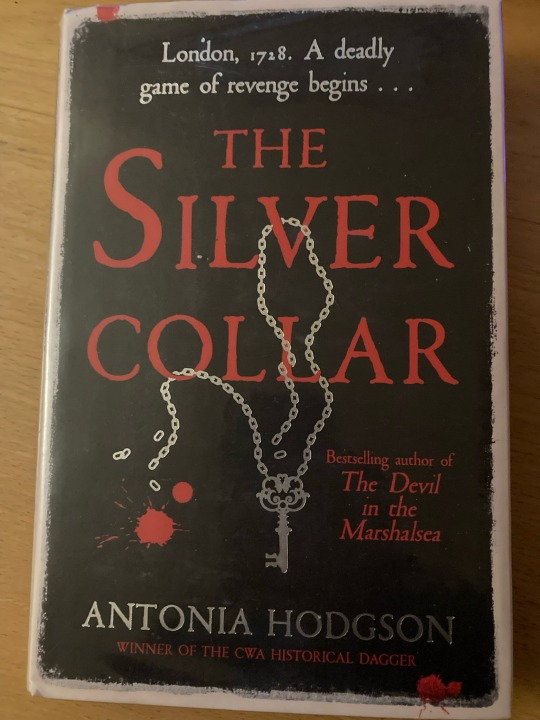
Owned?: No, library
Page count: 312
My summary: Thomas Hawkins, after surviving a death sentence and the ire of all of London (it seemed), was looking forward to a quiet time of relaxation. But when a bothersome preacher darkens his door, he soon finds himself in a spot of trouble. What does the preacher want with his girlfriend Kitty? Who wants him dead? And when he finds the truth, how will he save himself and Kitty from a terrible fate?
My rating: 4/5
My commentary:
Some books just sort of call to you. Like this one, as a point of fact. It was out on one of our displays in the library, and I kept casting it curious glances every time I was shelving or doing the item request and happened to wander by. A historical mystery set, not in the Victorian era as is so common, but in the 1720s? Featuring a rogue who is notorious for having escaped the gallows, and touching on the impact of slavery in Britain? My interest, as I am sure you have gathered, was piqued, and I decided I was going to read this one posthaste. And, reader, I was not disappointed.
However, one note - is there anything so disheartening as getting about 50-100 pages into a book you're enjoying only to realise that, not only is it not the first in a series, but is in fact the fourth? People who design book covers should put that information front and centre, I swear it. Nevertheless, it is to this book's credit that I was never lost without the context of the previous books. Events pertinent to this book were recapped in a brief, but informative manner that was still entertaining, and the status quo of the characters and their relationships was well laid out from the get-go. Which, if you're going to come into a book series at the fourth instalment, was pretty much the ideal. No complaints from me writing-wise on that front!
So what of the actual book itself? It was a good read! I'm always interested in historical fiction that doesn't centre the white aristocracy or middle-class, and although the protagonist, Thomas Hawkins, is a gentleman by birth, he doesn't really have any of the privileges associated with it. Kitty, his girlfriend, likewise comes from money but is basically living as a pauper. There is mention of gay characters from previous instalments, and a major supporting character is Jeremiah, a previously-enslaved black man who is searching for his daughter. Jeremiah is interesting - the traumas he has experienced meant that he spoke with a stammer, but when he tells his story in writing he is eloquent and passionate. He is dedicated to his daughter, to the point of calling out Thomas when it seems that Thomas is just using him for his own revenge, and not wanting to help Jeremiah on his own and for his ends. This idea of a man born into slavery who manages to free himself and carve out a life is incredibly compelling, even if it's ultimately not the point of the book.
That's not to say that our main protagonist isn't anything to write home about, either. Thomas is exactly my kind of historical male character - rogueish, dashing, criminal, but with a heart of gold and a burning passion to do what's right, even when it goes against the social mores of the time. What I liked about Thomas was that he had elements of the Genius Detective archetype - he's very quick and makes logical deductions based on cold-reading his clients - but he shows how he came to his conclusions or where he just bluffed or made a lucky guess, and sometimes he's wrong, with devastating consequences. It's a more realistic take on that trope and I'm glad to see it. He's also chugging that Respect Women juice, which for an 18th century fella is very good to see.What else? Kitty, Thomas' not-wife, is a reasonably strong character as she fights against her kidnapper, though at times she did fall too much into the distressed damsel archetype for my liking. The villain is deliciously evil. And the glimpses into Thomas' past adventures, far from putting me off, ended up galvanising me to request the three previous books from the library. So, uh, watch this space for those, I guess!
Next up, we're back to the world of the vampire, as Lestat takes the stage.
6 notes
·
View notes
Text
Cinderella (1950)
Cinderella is the opening film of the Silver Age, and one of the most notable films in Walt Disney history. This movie set a huge precedent and is still exceptionally popular in the minds of young and old alike today. It has a Rotten Tomatoes score of 97%.
Cinderella is a fantastic movie that pulls Disney out of one of its darkest times in animation history and makes a profound comeback. It has set a multitude of precedents, some positive and others not, and has remained a staple in United States media since its release in 1950. It has a good plot and consistent theming as well, featuring a mostly interesting cast of characters. Unfortunately I can not attest to the prince’s personality, which is predominantly nonexistent. Beyond that, the movie is well-crafted and well-executed. I should elaborate upon two specific precedents this movie sets that are rather concerning although completely unintentional and not problematic if contained in this film alone (which they unfortunately are not). The lesser of the two, although still bothersome, is the premise that cats are inherently harmful and malicious. Lucifer, a cat literally named after the devil, is a sadistic, cruel, and overall terrible character. It is continuously implied that all cats are like this, not just him, although he seems to be an exaggeration of this characterization. The second problematic precedent set by Cinderella, which is both more impactful and harmful, is that of women as submissive “damsels in distress.” In Cinderella, Cinderella is submissive to most of the characters in the movie and in order to escape she has to be saved by a man. It should be noted that in her film she essentially gets herself out of a bad scenario, continuously advocates for herself, and works hard to achieve her own happiness. Her intention of going to the ball is not to be saved by the prince, but to have a singular night of freedom. Rather, this trope is not at the fault of the actual story of Cinderella, but the poor interpretations of the audience. However, the narrative persists nevertheless.
In conclusion, Cinderella is a great opening into this next era of Disney animation. Overall, Cinderella receives 10 out of 10 stars from me, a perfect score! It initially lost a point for Prince Charming’s nonexistent personality, but easily regained a point back with its wonderful music. It also passes the Bechdel Test.
Summary of the film under the cut.
Cinderella opens like a storybook, introducing the protagonist as a young girl with a widowed father. Her father, with the intention of giving her a loving mother and expanding their family, married Lady Tremaine, a wealthy woman with two daughters, Drizella and Anastasia. However, after a short while Cinderella’s father died, leaving her alone with the rest of her family. Her stepmother began to abuse her, and eventually after years of disrepair and poor spending at the hands of Drizella and Anastasia, Lady Tremaine forced Cinderella to become the family’s servant. Flashing forward to the present day of the story, Cinderella is living in a tower on the side of the family’s manor. She is awoken by birds and mice, her closest friends. She tells them of the dream she was having, her dream of leaving her abusive household for something better. One of her mouse friends, Jaq, informs Cinderella about a new mouse in the house that is stuck in one of the traps. Cinderella rescues and clothes the mouse, named Gus Gus. Jaq then spends an extended period of time explaining to Gus Gus all of the workings of the household, but predominantly the presence of Lucifer, the cat. Lucifer is exceptionally sadistic and has not notably killed any of the mice, but has a reputation for torturing them. Cinderella begins her daily chores, which include feeding Lucifer, the chickens, and the rest of the farmyard animals. She also feeds the mice, but they cannot obtain food until Jaq distracts Lucifer, who is lying in wait. Afterwards, Cinderella goes inside the house and upstairs to her stepsisters’ and stepmother’s room. There the three of them give her a variety of additional chores such as doing the laundry and mending their clothes. Anastasia finds Gus Gus, who was previously hiding under a teacup from Lucifer, on her breakfast tray. Absolutely appalled, she blames Cinderella for this. Cinderella is called into Lady Tremaine’s bedroom, where she is given her punishment. Since she “has enough time for pranks, she has enough time for extra chores.” The story pans over to the king, who is having a complicated conversation with the duke about the loneliness of his castle and his fraught relationship with his son. He wants to have grandchildren to improve his life, so he is creating a ball commemorating his son’s return to the kingdom in the hopes of finding him a wife. Back at the Tremaine manor, Lady Tremaine is instructing Drizella to sing while Anastasia plays the flute. They are both very bad at this, which is obvious considering Lucifer’s negative response. Meanwhile, Cinderella is singing the same song beautifully as she cleans the base of the stairs. While she is cleaning a letter is delivered on behalf of the prince. Cinderella immediately delivers it to her stepmother and stepsisters upstairs, who are thrilled to be invited to the upcoming ball. Cinderella notes to Lady Tremaine that all available maidens are required to attend, therefore she has to go as well. Lady Tremaine makes a deal with her, agreeing that she may attend. Cinderella continues to work hard into the evening. Meanwhile, her animal friends are working on her dress so that she can attend the ball in style. Jaq and Gus Gus sneak into the room in which Drizella and Anastasia were previously dressing and get past Lucifer, managing to take a beaded necklace and a sash, both of which were thrown away by the stepsisters. The mice and birds manage to complete the dress. At first Cinderella does not know this, and tells Lady Tremaine that she cannot go, which pleases her stepmother. However, after discovering the dress in her room, she runs down the stairs in a hurry and makes it in time to leave. Lady Tremaine points out the beads to Drizella and Anastasia, emphasizing how beautiful they are. This act is not out of love or appreciation, rather drawing attention to the stolen accessories. Drizella and Anastasia immediately rip apart Cinerella’s dress, leaving her in rags. Not being able to attend the ball in this state, her stepmother and stepsisters leave her behind, while she runs out the back door to cry in the garden. Suddenly, glimmers of light surround her, but she does not notice. Her Fairy Godmother appears, a magical woman who believes in Cinderella’s dream to escape her abusive household. She blesses her with the magic of her wand, singing the infamous song “Bibbidi-Bobbidi-Boo,” and proceeding to turn a pumpkin and Cinderella’s animal friends into a functioning horse-drawn carriage. Cinderella then has her dress not only restored but drastically improved. She goes to the ball as initially planned. Meanwhile, at the ball the prince remains uninterested towards every princess he is introduced to. The king is panicking, but Cinderella walks in the background just as her stepsisters get introduced, and immediately catches the prince’s attention. The king notices this and encourages the orchestra to play a waltz while the lights are dimmed, setting his son up for a romantic evening. Prince Charming and Cinderella dance into the night, and at the end of the night they kiss. Cinderella then realizes it is midnight, which is when the spell granting her the dress and coach will disappear, so she panics and leaves the castle. Prince Charming and the duke try to stop her, but they are unsuccessful. She gets away and resumes her life. The prince is not done trying to connect with her though and uses the glass slipper she left behind as a means to find her. He has the duke put every woman in the kingdom try on the shoe. When he arrives at Cinderella’s home, Lady Tremaine locks Cinderella in her tower bedroom. Drizella and Anastasia desperately try to put on the shoe, forcing it onto their feet. At the same time, Jaq and Gus Gus are trying to get the key out of Lady Tremaine’s pocket. They eventually succeed, but are pursued by Lucifer, who traps Gus Gus underneath a tea cup. The birds manage to summon Bruno, the family dog, who chases Lucifer out a window. Despite not being seen for the rest of the film, it is assumed Lucifer lives because “cats always land on their feet.” They get the key to Cinderella who manages to get down the stairs right when the duke is about to leave. They start to bring Cinderella the glass slipper, but Lady Tremaine trips the man carrying it, and it shatters. However, she has the other one. Cinderella is proven to be the woman Prince Charming is looking for, and the two of them get married. They live happily ever after.
#disney#disney movies#cinderella#walt disney world#disney world#disneyland#movies#movie reviews#animation#animated movies#the reviews
0 notes
Note
what’s the tea on sao? like what makes it bad im out of the loop on this one
i dont know where to start.. but i will give the main points. do note this is my personal opinion. if you love the show then that’s fine, but anyway..
Kirito is the blandest and most boring protagonist from any anime ever. He is stupidly overpowered and he is depicted as a saviour of damsel in distresses. There is no logical explanation to why he is just strong.
Many timeskips makes the storytelling incoherent.
It is a harem anime disguised as an isekai rpg. Literally every girl Kirito meets wants to get in his pants
The logic and plot holes. I’m just gonna tell you the ending of SAO absolutely made no sense and if that was the solution all along, then Kirito should have done that since the early episodes. It’s stupid and laughable. When did he even learn how to hack..
Rape trope. Asuka is mistreated. Also, they did an incest type of plot in a later season lmao.. it’s really the last thing anime needs 💀
Boring anticlimactic fights because you know Kirito will win anyway. Also, no thinking involved. There are much better fight scenes out there that will keep you on your toes. The stakes are NOT HIGH in SAO.
Squandered potential. Promising synopsis, only to be let-down and disappointed.
Anyway.. the only good thing about SAO is the soundtrack slaps. The anime openings are bangers. LISA got her big break thanks to SAO. Adamas and Crossing Field are amazing, so listen to them. Other than that, avoid this anime and watch Jujutsu Kaisen, Demon Slayer, Fullmetal Alchemist Brotherhood, Attack on Titan, My Hero Academia, and whatever anime that’s relatively popular.
SAO is a disgrace and I’m just in disbelief how an anime so bad ended up being the “isekai” staple. If you want better isekai, the Rising of the Shield Hero and Re:Zero are much better
50 notes
·
View notes
Note
When does a trope become a cliche in your opinion?
Thanks for the ask!
So, first, it's important to note that this isn't some easy sliding scale--the entire point of a cliche is that it's an overdone trope, and whether something is overdone varies from person to person.
[Some things that are pretty universally considered cliche, though, are the "damsel in distress" (weak feminine girl is put in danger in some way, must be saved by the strong male protagonist) and the "evil mcbad guy dark lord" (as i like to call it. super evil guy takes over everything, knows how evil he is, completely 1-dimensional).]
I think a trope becomes cliche when there's nothing new the interpretation is offering. People like tropes because they give a general structure of one element--e.g found family--while still retaining unique elements. They're familiar, but not boring. A cliche is familiar to the point of boredom.
That's why I don't understand the whole "I hate cliches *cut to a trope the person likes* oh my god, Trope I Like" meme. A cliche is a term that inherently means you think the thing is not only used a lot, but overused.
And like... yes, a cliche is still a trope! An overused, boring, and badly done one. That's why trope is a neutral word, instead of an exclusively positive one; tropes do contain cliches.
But tropes can be very good, as well. There are tropes in almost everything, especially SFF. Even if they've been twisted and changed, they still are tropes! See: the Chosen One is a trope, but is done in many different ways.
Tropes are a tool. Cliches are a problem.
Anyway! That became a bit of a tangent! To go back to my rather roundabout point, I think a trope becomes cliche when and only when it's overused and unoriginal. There's a difference between tropes you just don't like (e.g. soulmates, enemies-to-lovers, Chosen One, whatever) and cliches (damsel in distress, evil mcbadguy).
(They can cross over, of course, but as a rule: tropes are neutral, cliches are bad.)
#i am incabable of being concise ever. sorry skjhsdkhfksdhkf#asks#anon#tropes#cliches#its just soooooooooo annoying to me when people say that something they like is a cliche when they mean TROPE or that all tropes are bad
4 notes
·
View notes
Note
.... Omg! Can you please give us analysis of each character and how they are portrayed in the book and then the movies?
Oohh ok! (I’m just gonna go thru the characters and how they are in the book vs how they are usually portrayed in adaptations. These things do not apply to every single adaptation, or even necessarily one specific adaptation, full disclosure, lol) (also this will be very long, so, it’s under the cut.)
Mina:
~ In the book: kind, sweet, caring, motivated, intelligent, interesting, funny. I could go on and on. The protagonist. She IS the moment. She could defeat Dracula without the men but the men could not defeat Dracula without her. I said what I said.
~ In adaptations: typically kind, but may or may not be any more intelligent than the men. Typically portrayed as a damsel in distress, though in the book she isn’t. Almost always Dracula’s love interest. Sometimes she even low-key betrays the Crew to help him. Her personality is very often reduced to one or two traits/archetypes so she can better fit the role of Dracula’s love interest.
Jonathan:
~ In the book: Damsel in distress. He can sometimes come across as boring, because he’s the only very average person in the book, but that’s because he’s supposed to be. It’s a compare and contrast type of thing. Even then, he’s incredibly brave, and incredibly determined. He represents the average person, rising up to the challenge.
~ In adaptations: oh, Jonathan?? You mean the only reason why Mina and Dracula can’t bone??? Yeah but it’s fine if Mina cheats a little bc also he’s an asshole for no reason :////
Lucy:
~ In the book: A delight. Absolute angel. Everyone loves her and she loves everyone but not always in the way they want. If she could she would move all of her friends into a little cottage and bake bread and make tea for them for the rest of forever. Part of the reason why her transformation into the Bloofer Lady is so scarring is because she was genuinely so good-hearted before that.
~ In adaptations: lol she has three suitors so she must be suuuuper promiscuous (side note: not a bad thing but most adaptations portray it as such), and also because of that she definitely wanted Dracula to turn her into a vampire.
Arthur:
~ In the book: Lucy’s fiancée. Also he’s fuckin loaded so he helps fund the whole expedition. Interpretations of him change kinda drastically because he’s not given much canon personality or back story, but he’s overall a pretty decent guy. He can be mean but, like, in a loving way.
~ In adaptations: if he’s there at all he’s usually Just Some Guy. Which, like. fair.
Jack:
~ In the book: a psychiatrist who desperately needs to see a psychiatrist but he is not self aware enough to know this. Used to be Van Helsing’s student. He definitely can be an ass (especially to Renfield), but it’s usually more that he just doesn’t think how his actions affect other people all the way through than him actively being a terrible person on purpose, if that makes sense. Him and his interest in science and technology symbolize the heralding of the new age, which is in contrast with Dracula, who is only ever “living” in the past (bedum tsss).
~ In adaptations: sometimes he’s Van Helsing’s peer rather than ex-student. Usually he doesn’t still keep a phonograph, or even an active interest in technology, which is...a disservice. He can either be nice, or mean, usually not very nuanced or interesting. Honestly I feel like usually in adaptations he’s kinda just used as the gap to get Van Helsing there and then he does nothing after that.
Quincey:
~ In the book: literally the guy who kills Dracula. A Texan, as well, which seems funny now but at the time it was a fairly common trope to add in a foreigner. He’s pretty calm always, especially in a crisis, and also willing to step up and do whatever’s needed of him. And, again, he literally kills Dracula. Easily one of the more important characters in the book, except he doesn’t keep a diary so most people don’t acknowledge this. Also at one point it’s stated he’s rich af iirc so that’s funny.
~ In adaptations: what do you mean we should add the guy who killed Dracula??? Nah it’ll be fine without him
Van Helsing:
~ In the book: he’s the hero of the story (not the protagonist, that’s separate). Him and Dracula are character foils. He’s the guy who knows everything about vampires, and also the guy who specifically knows how to stop Dracula. Even then, he isn’t a professional vampire hunter, or even, like, an expert. He just happens to know a shit ton about this. His name means “father of multitudes” and he is the Designated Dad of the group. He probably makes everyone hot cocoa and tells them weird stories about spiders drinking oil from lamps after a long day.
~ In adaptations: murder grandpa is an asshole who also has no idea what he’s talking about because it makes Dracula look better
Count Dracula:
~ In the book: the villain. He could represent a lot of things — anything from a plague, to the past creeping up and not staying buried where it should, to Stoker’s internalized homophobia, to Stoker’s own xenophobia or antisemitism, or all of the above, or none. He has a lot of layers and each layer is a new level of villainy. We don’t know a lot about him, admittedly — who he was in life, why he became a vampire, what all of his powers are, or even his motivations for coming to London. He can represent any evil we want at all, which makes him a very affective villain. Also he’s supposedly related to Atilla the Hun which is funny af to me for no reason
~ In adaptations: incel!Vlad III
Renfield:
~ In the book: admittedly, he does not have much baring on the plot. He tends to act as a meter for how close Dracula is at any given moment, until his death when Mina takes over that role. However, he introduces many themes and topics into the story: insanity, corruption, idealization of evil, etc., and he and Lucy work together to showcase how vampirism corrupts and how it can destroy even relatively innocent people. Even though Renfield has a bit of a reputation of being violent and volatile, he only ever really does something violent once, which wasn’t even entirely of his own volition and he sacrifices himself for the greater good.
~ In adaptations: oh no scary evil insane man1!!11! he’s obviously just horrible it’s not like Dracula is manipulating him!11!! if Dracula were to manipulate him then Dracula wouldn’t be a sympathetic antihero :(((
The Three Weird Sisters:
~ In the book: the antithesis to Lucy’s suitors. They are supposed to be seductive, and dangerous, above all. They might be Dracula’s victims, or they could be some other vampires unrelated, we don’t really know. Not much is said about them and that’s likely very much on purpose. They have the same air of mystery about them as Dracula does, if not more. A lot of the horror in this book is based in the fear of the unknown.
~ In adaptations: walking boobs with fangs. Usually so much is changed about the story that none of the above is even relevant or can be applied to them.
Anyways thanks for the ask and I hope this answers your question :)
34 notes
·
View notes
Text
Today, I came to talk about the inspirations I have for Jiyuu.
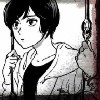
I’m late to this, but this is basically what makes her up and dictates the way she conducts herself on the usual; and during times when she is just by her lonesome.
The general inspiration for Jiyuu is the amalgamation of literature that have been passed down through generations along with the changes it underwent and still undergoes as time moves forward and progresses.
As a child, the gist of her character is reflective of the values and moral lessons that one learns from reading fables and fairytales; of happy endings and happily ever afters; that these things are attainable so long as one meets the criteria that the protagonist of the story possess; diligence, kindness, resilience, selflessness, to name a few-- but overall, her childhood represents the moral aspect of a story’s hero/heroine. Their willingness to help others and endure, in the belief that this was the true way to attain both peace and joy; that good deeds are rewarded-- and that the reward is the happiness of those around them.
Of course, not all fables and fairytales end beautifully; some mark their last chapters on a tragic note. The end of Jiyuu’s childhood and the start of who she becomes while growing up is a reflection of the darker side of these tales-- ironically, some of which were the original sources of the stories that have been twisted throughout generations in order to appeal to the general audience. How? By taking away its darker tones and endings, and thus replacing it with concepts that inspire people to mirror an ideal life filled with optimism and positivity.
Even the girl's eventual need to make money is a reflection of how companies, industries, etc., try to bank on re-spinning tales and packaging it differently in order to make a profit.
Just the same, her desire for freedom is a reflection of people’s constant need for self expression as they create more and more tales. It's also the struggle of the creation process, as well as the willingness to take up the pen and write in order to diversify the ever changing world of literature. It is the hope of one day reaching an audience that can accept a piece of written work for what it is, all-the-while coming into terms with the notion that literature is often consumed subjectively and is open to varying interpretations that may or may not always be agreeable-- and that that in itself is perfectly, and understandably fine.
Here are Some other things, lore, and tropes that put her into perspective:
The Damsel is Distressed: As a sheltered young lady, Jiyuu could have used some saving from many things. A lonely home which she often denied to be lonely; parents who see her as an ornament to boost their reputation; her own naïve mindset which thought that if she was good and did what everyone said, gave in to what they want, gave up what little she truly had for herself-- that it would bring her some semblance of happiness and satisfaction. Well, that brought her something alright, a lot of regret, resentment, anger, and anxiety, for starters.
Evil Sister with a Heart of Gold: Jiyuu has an adopted sister who she loves to bully because why not? Her step-sister was pretty, pretty stupid, was made to take credit for achievements that Jiyuu worked hard for, was given the love that Jiyuu hoped would be shared with her, became a promiscuous and spoiled brat. Somehow, rather than the truth behind the flashes and blinding lights, everybody just loved a sob story about how an orphan was adopted and raised so well and into perfection. In addition to that, everybody wanted a story about a scandalous, jealous older sister... even if it meant that all of it was just a fabrication. What can you do when life was controlled through the lens of a camera? For her, at that time, nothing apart from playing the part she was forced into. So eventually, she began to despise the orphan that her family had taken in, picking on her at any given chance, at any given time. Even if, in reality, she actually truly loved the girl, she could no longer stomach seeing her. Jiyuu knows that she was part to blame, but also blamed her parent for always using their children like this-- a publicity stunt, an ego booster, just another tool for some additional fame.
“Maybe if I had done something sooner, maybe I could have preserved her innocence a little better...”
So, are you a spoiled, naïve rich kid who has never experienced working hard a day in your life? Have always been spoiled, doted on, and given everything that you’ve ever wanted? If you are, she's probably going to be extra hard on you too. After all, she wants to correct the mistakes that she made, and if she couldn't do it for her sister, then she will do it for someone else who'd benefit from the cruelty.
Bitch with a Heart FOR Gold: Jiyuu likes money. As someone who has lived off on wealth, discomforts are very hard to ignore. So when she no longer associated herself with her family due to snapping from mental abuse, running away from home led her to new dwellings and experiences; experiences that would reteach her how the world works through a particular perspective; one that would allow her to live as humanly comfortable as possible without being thrown away like some piece of garbage.
Reverse Stockholm Syndrome (Lima Syndrome): So she ran away right? Jiyuu ends up getting captured by a couple of criminals who operated a pub at that one shady place downtown. They recognized who she was and placed a ransom, however, no one came to get her-- Feeling quite sorry for the kid, the boss and owner of the pub takes her in and cares for her... in the best way a criminal could for any one of his goons.
It’s a dog eat dog world: “Don’t mistake this place for a home or a family, kid. There’s none of that bullshit here. This place, it’s a business. You slack, princess, and you’re dog meat.”
Safe to say, Jiyuu’s boss retaught her everything when he saw how pathetically sheltered she was. The knowledge that she had was for little girls who would not survive a day out in the wild. So he mentored her; trained her in practical life skills, introduced her to a hobby that could bring in money, made her go with his loan sharks to show her the ropes on how to successfully collect from valued clients.
All the fun things that may or may not be harmful to someone’s health.
“Her only real redeeming quality is being hard working and resilient. The cute face? A bonus. Might as well put this broken mutt to good use.”
As the years go by, things become more manageable. Jiyuu may not be the best in all fields that have been pounded into her head, but she does excel in certain areas that allow her to live somewhat comfortably-- at least enough to scrap up something decent for herself amid fierce competition. She may not be the best at making someone hurt, and may often need tools to execute such things... but Jiyuu can probably knock someone out in ways that were a little less violent... or at least that's what her patrons say after a shot or two of her pretty looking drinks.
Well, that's it for now.
#Pretty long post.#I rambled too long.#Mirror Mirror on the Wall... [ HC & Character Studies ]#tw [ some implied abuse and violence ]
2 notes
·
View notes
Text
[Review] Portal Runner (PS2)
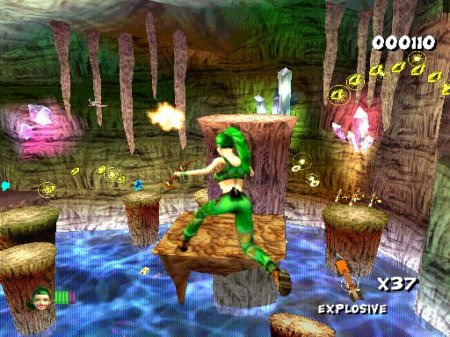
For my final game of 2021... why not this Army Men spinoff?
I’m not too familiar with the Army Men series, but I played the GBC version of this years ago on a stream. An errant comment recommendation led me to pick up the console version, and my friend Laureline picked the related game Sarge’s War for game club this month, so I took that as an excuse to get around to this. Compared to the gritty turn that Sarge’s War took the series in, this was a light-hearted romp with a dodgy control scheme.
The heroine is Vikki Grimm, who is otherwise the Smurfette of the Army Men franchise and love interest of the lead character Sarge. The series has covered genres from strategy to air combat to third-person shooters; this instalment with an odd name fits broadly in the latter category (and its story directly follows Sarge’s Heroes 2), although there’s lots of platforming to be had as well. Vikki grabs a bow for her playable outing—with a wide variety of specialised arrow types—and gains a lion companion in Leo. Various levels will have you control different combinations: Vikki or Leo alone, Leo following you, or Vikki riding him.
The companion mechanics are a little underdeveloped though. Even when Leo is supposed to be a partner he’ll often get separated from you and your actions are limited, and riding him is just like controlling Vikki but faster. Here I’ll bring up the controls again because they cast something of a pall over the whole experience. The game uses tank controls (Tomb Raider is perhaps a reference point), which are poorly suited to the platforming... or anything, really. They’re slippery, and their directionality is irrespective of the camera position, which I found disorienting, so I left it alone as much as I could. The dedicated strafe buttons help, but not enough.
The game partially fulfilled one of my wishes for it: using the fact that all the characters are toys. Most of them have a plasticky sheen, which in this case is intentional, and some levels take place in eg. a sweets shop, or a giant chessboard. This kind of thing always charms me. Other levels just use the toy factor as an excuse for somewhat generic fantastical settings in dinosaur times, medieval times, or space alien times, although they are nice and colourful.
Originally, the GBC version caught my eye due to its female protagonist... but as a feminist text it could be better. The central conflict is between the only two women in the cast over the affections of a man, with a side conflict between Vikki and her strict father, both tired sad old tropes. The changing settings put Vikki in new, usually revealing, outfits, and she even gets imprisoned into a damsel in distress role at one point in her own game, leaving the lion to save her!
Oh well, they can’t all be winners. There’s a basic multiplayer mode that’s not worth bothering with, and an unlockable gallery for finding secrets and collectibles in the levels. I enjoyed collecting them as an end in itself and exploring the maps, more than the simple combat and janky platforming at least. On the whole I reckon the GBC version, with its larger enemy variety and combat mechanics, is the superior game despite its obvious limitations. One final note, I was tickled to recognise a reused music cue from another 3DO Company project that I’m intimately familiar with, Heroes of Might and Magic 3, as well as some sound samples that were also used in Conker’s Bad Fur Day! (The same vocal sample is used in the music track in both games’ prehistoric world, and I think maybe the Martians have the same voice as the armoured Goblings...!)
3 notes
·
View notes
Text
Helen McCarthy and the importance of women in anime and manga fandoms
(This interview took place in 2019, now published for the first time in a two-part series. Read part one here.)
A longtime fan of Japanese comics, British writer Helen McCarthy was determined to showcase women’s place in art and fandom.
Before she achieved acclaim as a manga expert, McCarthy experienced significant sexism in the world of publishing. In the ‘80s and ‘90s, comics and cartoons were considered “kids’ stuff," therefore no specialized knowledge was required to review or write about them. As a result, publications reviewing manga often gave assignments to male staff instead of paying a specialty (or female) freelancer.
“My personal issues with sexism really aren't different from anyone else's, and sadly things haven't changed enough in almost 40 years,” McCarthy said via email. “Patronizing, condescending gatekeepers, both male and female, remarks about my appearance, questions about my personal life, uninvited chat-ups, the lot. I had no physically unpleasant experiences because despite being small and apparently defenseless, I am sarcastic, loud and threatening when necessary.”
To combat this sexism and gatekeeping, McCarthy made Anime UK gender neutral as a matter of policy. It made sense to do so, as very few writers at the time had working knowledge of Japanese animation. Today, however anime and manga news sources like Anime News Network (ANN) are typically open to hiring anyone who has the skills they require.
But despite that inclusivity, McCarthy added that “women starting out in the field seem to face more active hostility and negativity. It baffled me that those attitudes come both from a section of the male anime community and from women who collaborate with patriarchal views, or men impersonating women online.”
While women have always existed in the world of anime and manga, as artists, fans, or anything in between, they have never been the majority. In recent years, women have claimed space for themselves in manga fandom, and are “very feisty, very vocal and very well organized,” McCarthy noted.
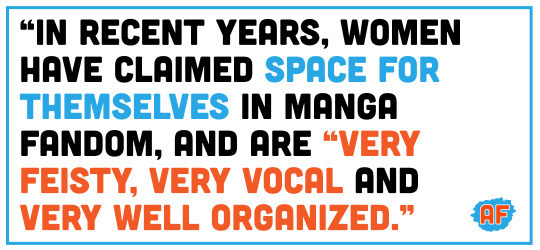
McCarthy recalled a group of young teen women who created an anime-focused zine, developing a space for girls like themselves. A number of those artists are now scholars, professionals, and “just astonishing people.” There is also a cohort of Western manga artists who were teenagers when McCarthy began writing about Japanese animation in English. Among those remarkable women are Leah Holmes who is working on her PhD and studying the unrecorded early history of anime in the UK, as well as artists Laura Watton, Emmeline Dobson, and Mary Beaird whose Elephant, Elephant, Hippo, Rhino…? comic strip is a favorite of McCarthy’s.
More than 30 years later, McCarthy sees the fandom as a much more inclusive place where women can not only claim their right to be there, but have their own space. Sites like Crunchyroll, My Anime List, Naruto Forums, as well as a long list of fan-made forums and social media platforms, have provided anime and manga fans with the space to get together and discuss the things that they love without fear of being ostracized. This space has allowed female fans to showcase their prolific commitment to the genre.
“Now I see young women claiming their rights, staking their claim in anime and manga fandoms,” McCarthy said. “[They’re] producing amazing artwork, producing amazing costumes. And the great thing is that there are now more and more young men who are willing to work with them on their own terms."
Despite the strides that women have made in the world of anime and manga fandoms, there is still significant misogyny and sexism within the genre. Although some stories feature a strong female protagonist (and sometimes multiple female protagonists), problematic, sexist tropes exist throughout manga/anime. As user Zylania noted on the forum Amino, women are often portrayed as stupid, defenseless damsels in distress. Their breasts are often oversized, distracting focal points for male characters and, in some cases, the women don’t even have heads or faces to differentiate themselves. In some anime and manga, females are never shown above the neck. Additionally, the increasingly popular Ahegao shirts — a term from hentai (Japanese pornography) for a woman’s often exaggerated orgasm face—are sold at manga/anime conventions, which puts female sexuality under a distinctly male gaze.
“Japan is a modern, developed society like America, Russia and Europe, and racism and sexism are not exactly dead in any of those areas,” McCarthy explained via email. “It's a combination of centuries of male privilege and prioritizing the male gaze and male concerns. The attitudes and history that gave the Internet the Captain Marvel trolling incident are alive and well all over the world. Most Japanese people have very good manners, which can make it seem as if outdated attitudes like that couldn't possibly exist there, but Japan isn't some fairyland where everyone is magically polite, reasonable and politically correct, except in our dreams.”
However, feminist women and works do exist in the genre, though it can be difficult to find them. San from the film Princess Mononoke and Major from Ghost in Shell are two characters often referenced by fans who are looking for strong, iconic women. McCarthy said Princess Mononoke is Hayao Miyazaki’s best example of a feminist character, since San does not rely on a man (Ashitaka) to rescue her and exists independently from male characters. San is free to live as she pleases and does not ultimately “belong” to Ashitaka by the end of the film.
So how can a feminist watch anime and still be empowered? McCarthy encourages women to watch everything they can. “Women in the fandom have to know what’s going on outside of what they’re watching. If you don’t know what the men in the community are watching, you can’t combat the concepts they are being given about you as a woman,” she said.
McCarthy encouraged feminist anime fans to be fearless. “You decide what's feminist and what isn't. I hope that that encourages a few other young feminists to go out and do what they do so beautifully, which is just be great women.”
After decades spent writing books and articles, and making appearances, McCarthy has spent the last 10 years slowing down. McCarthy is most concerned that the work she’s doing is worth being done—and being done well.
She has devoted her life to advocating for inclusivity in fandom and hopes to pave the way for other women to follow in her footsteps. McCarthy encourages other women to embrace their potential, especially as men become more in tune with the equality presented through feminism.
“My response to anyone who tells me they can do better work that I do — and trust me, there have been and are a lot of them — is to say, ‘Please, do it,’” McCarthy wrote. “I absolutely love reading great work by other people. I will be delighted to read yours, either right now or when you stop wasting your time sniping at other people and get around to writing it.”
READ PART ONE HERE
--
Amanda Finn is a Chicago based freelance journalist who spends a lot of evenings in the theater. She is a proud member of the American Theatre Critics Association. Her work has been found in Ms. Magazine, American Theatre Magazine, the Wisconsin State Journal, Footlights, Newcity and more. She can be found on Medium and Twitter as @FinnWrites as well as her website Amanda-Finn.com.
7 notes
·
View notes
Text
man. i know this episode deserves accolades out the ass and we have collectively talked it to death as a community, but the back half of mr. yin presents is so, so powerful. let’s dive in:
chief cares about her people above all else; you see her, for the first time ever, arm up and offer to drive when she knows where yin has taken juliet. she is using every tool available to her to make sure her team is safe, she constantly insists on shawn/gus/henry (who are civilians) being given stricter security, she takes the blame when juliet disappears.....she cares SO MUCH.
henry would do absolutely anything for shawn. they were a bit cool this season — there’s a few moments where henry sardonically notes that he’s almost always the one who helps shawn unravel his case. he literally bails shawn out from a false accusation in think tank. but when he knows abigail is in trouble, and knows shawn is going to save her alone, he takes a job he didn’t really want just so he can go after his son.
AND BOTH OF THEM IMMEDIATELY PUT ON THEIR CHARMERS TO KEEP ABIGAIL CALM. without hesitation, henry leaps right in with his swiss and cuts abigail free under the pier. shawn and henry spend so much time consumed with their differences that they don’t ever acknowledge their similarities, and especially not the good similarities. both these men have everflowing compassion that are overlaid by their affable manner (shawn) or rigid competence (henry) and it is so gratifying to see them come together at the climax of the episode
gus is just the...the bravest and kindest man. he cares so much about shawn, and has really come to trust and love the entire team. it is amazing to see him seriously involved in the episode, as good as his support system for shawn was in the first yang episode. shawn may have the psychic-ness, but gus is the heart of psych. gus is (very realistically!) afraid of these terrible situations they find themselves in and hates the sight of blood and is adamant about not becoming the casualty of a slasher movie trope...but he is the first to go after juliet when they lose sight of her in yin’s trap. he picks up her gun and chases after her in a secret tunnel. he goes to the clock tower when shawn cannot because they trust each other SO MUCH, and keeps the wire from snapping even though it is the mechanized clocktower for an entire city because he is a brilliant and brave and strong man and i love him with all my HEART
no one needs Another Essay About Lassiter And Juliet from Me, Bolt Lightning, but god. i’d noticed a few episodes in that their dynamic in s4 has shifted to lassiter being overly friendly with juliet because he trusts her that much, while juliet is a lot more confident in their relationship...but their trust and love runs so goddamn deep. for the first time in the entire series (and i think for the rest of the series total!), lassiter directly defies chief’s orders. he sets off on his own to go get juliet as soon as they figure out the clue and doesn’t even stop to consider what it may do to his career if he does. carlton lassiter!! carlton fucking lassiter who, one episode ago, was telling everyone to shut the hell up so he could chase a fantastical lead and get better press coverage. he is petty and mean and calloused but he is loyal to his very bones, and juliet has earned every ounce of his trust.
and juliet...i feel like women who are competent and in actionable roles often get written into a box where they’re defined by their badassery. they aren’t allowed vulnerable moments because it doesn’t suit their image as an asskicking action girl. but juliet is both in spades in this episode; she is fearless and dedicated, and walks into what she knows is a trap because it’s what needs to be done. she knows the risks. she does it anyway. and juliet has never been a damsel in distress — most of the time she and lassiter are bailing shawn and gus out from danger — so the way she faces this says so much about her. that she reads yin’s clue as he directs, and still tries to let shawn know that abigail can be saved too with what little opportunity she has? even though shawn has kind of been an ass to her for the last year? fucking STELLAR.
she stares straight ahead the entire time she’s on the clocktower, even after gus and lassiter save her, and you can see the absolute terror and eerie acceptance in her eyes. she knows shawn will go to abigail, and she would prefer it. abigail is a civilian, she is not.
maggie lawson is so talented jesus christ. like they all are but this performance is so phenomenal
and then we get that amazing, powerful, wordless shot of her and lassiter at the end. anyone would be rattled after that, and juliet, who is always a beacon of understanding and acceptance and cheer, is going through shock. i actually paid enough attention to lipread on the rewatch and i’m pretty sure she’s insisting to lassiter “i’m fine, i’m fine” and lassiter just says “you don’t need to be fine” and she collapses against him. that fucking shit kills me man. carlton lassiter, the king of emotional repression, tells her it’s ok to not be fine. god. strike me down where i stand
this is getting unwieldy but shawn is the person of the hour. truly. he is such an amazing protagonist. i have so many gripes with how he’s written in certain spots of s4, and i’m sure i’ll talk more about that in s5 and s6, but good god. everything that happens in this episode is his worst nightmare — people he cares for are hurt because he can’t crack a case fast enough. his very profession puts abigail in danger. he has always been flippant, and wise-cracking, and even a little careless, but his intention was to put bad guys away and make a living. he knows the dangers of his career and his loved ones being put in harm’s way has always, ALWAYS made him deeply uncomfortable. and in this episode he confronts what is maybe the worst example of it in the show
he really, truly cares for abigail, and that this completely unpredictable side effect of his job likely ate him up alive for so long. he may have been a bad boyfriend, but he was so willing to see what she needed from him to make the relationship work after her rescue...shawn is also a character you rarely see vulnerable. he has a gun pointed at his head every second episode but he is almost always certain that some serendipitous event will happen to get him out alive. but this was all him. and he bares his heart to abigail, without any of his wordsmithery or reference-laden snark. this case took so much from him. and it truly beat him down the entire time
lighter notes:
i love buzz mcnab and he loves the team so much. tall king
mary’s death is really goddamn sad and it makes me doubletake at the way he’s been portrayed in the musical/second movie
if you read all this thank you very much please talk to me about carlton and juliet
13 notes
·
View notes
Note
Fir, fern, and bonsai for the floral ask? ❤️💐
Mia ! ! ! 💕💖💟💓💕💗💞
fern: if you could turn to anyone for guidance, who would it be?
The lion turtle from AtLA!!! I find Aang’s character arc so, so compelling as someone who really struggles to maintain a balance of I think is right and what I fear is necessary. The idea of the lion turtle not only understanding Aang’s reluctance to take a life (which is a totally valid concern that too often gets dismissed and even ridiculed by the fandom!) but also equipping him to administer justice while still solidifying the value of his ideology, and the legacy of his people is just *chef’s kiss*
bonsai: what is something you could spend hours, even days doing?
I haven’t worked on language learning much in the past few months, but there have been stretches of weeks where I didn’t do anything in my free time but take grammar notes, make flashcards, and practice speaking alone in my room like boo boo the fool I’m hoping to take it back up during the schoolyear!
fir: which tropes/archetypes do you find the most and the least compelling?
I'm a simple girl who enjoys a good hero's journey, as well as a good corruption arc. Dorian Gray? Beautiful. Azula? Stunning. Anakin Skywalker? Here for it. I’m also a hoe for masculine men who are willing to be emotional with one another (RE: the Lord of the Rings). I know morally gray protagonists are super in right now but I’m such a slut for people who are flawed but genuinely always try to do the right thing (RE: Obi-Wan Kenobi, Aragorn).
On the other hand I really despise the super badass woman who rejects all traditionally feminine things, as well as the bad boy -> sad boy trope. In my opinion the first isn't really a character, but a shallow reaction to the damsel in distress trope that was and is designed to give men a feeling of power and importance. So there came the badass fighter lady- but incidentally the only qualities that make up her character are qualities men will respect :/ I think AtLA's Suki best summed my feelings on it: "I am a warrior, but I'm a girl, too." I'm all for women being good fighters and mechanics and strategists! But when Hollywood writes them it's still for the male audience imo lmfao
Okay i started on the bad boy trope and then couldn’t stop so, trigger warning: rape and also I’m coming for Kylo Ren’s throat and also the whole ass sequel trilogy, y’all. Reylos, read at your peril. Mia, I am so, so sorry for hijacking this lovely ask :/
Bad boy -> sad boy trope is at best lazy writing and at worst an implicit affirmation of rape culture (and so I don’t understand why it’s so prevalent in the romance genre which boasts of so many female writers!). The bad boy is a young (usually aged 17-35), very conventionally attractive male who exhibits patterns that range anywhere from socially unacceptable to explicitly abusive. He often receives a half-assed "my mom died" and/or "my dad was an abusive alcoholic” which is meant to explain his behavior. If this were followed by an exploration into consequences and familial patterns, I’d be on board. But usually it only results in his love interest “understanding” him more deeply and writing off his abuse tactics because, in a way, it’s not really his fault. Besides, he’s still young, and wants to do better. It’s rarely addressed again.
Fact: while everyone needs to feel loved and no true love is truly wasted, your love will never fix the Bad Boy. The only thing that will is years and years of therapy.
Unfortunately there are too many good examples of the Bad Boy -> Sad Boy trope, but this is a Star Wars blog so I’m gonna talk about Kylo Ren again. Sure, he got a “redemption arc” (which was such bullshit and an insult to all redemption arcs. It’s not even an arc; it’s a fucking U-turn in the middle of the last installment of a trilogy. Make. An. Effort.), but he had his ardent fans and defenders long before TRoS, even after TLJ when he made the choice, of his own free will, to continue his path to the dark side and the legacy of murder.
(Side note: remember when Snape got a semi-redemption in TDH and people got pissed at Rowling because it seemed like she excused his horrendous behavior? I’ve been saying this for years and I’ll say it again: if Snape were a younger, more attractive man portrayed by Adam Driver, he’d have an army of supporters. I’m not saying Snape was a good person, or even that Rowling pulled off that redemption. But Kylo Ren committed crimes 1000% worse than Snape ever did. Given that they were both in their thirties when they died, you can’t even use age to defend Kylo as a lost, immature young boy and demonize Snape as a grown-ass man who should have known better. The only real difference between them is that Snape struck us as an unattractive, older man whose flaws struck a personal chord in readers (many of whom undoubtedly had a teacher who picked on students out of spite), and Kylo Ren is played by Adam Driver and I guess mass murder is a less personal crime to many audiences? The double standard simply disturbs and distresses me.)
The fact that Rey ends up falling in love with him, too, is perfectly on brand for the Bad Boy -> Sad Boy trope in the worst way possible. The first hints came in TLJ, when Kylo’s tragic backstory based entirely on some of the most blatant character assassination i’ve ever seen in my life holy shit elicited her compassion. This was followed by Kylo choosing the dark side of his own volition (not Snoke’s influence! After that choice, he should not have been redeemable), and then, of course, Rey falling in love with him sometime during TRoS. Given that torture scene in TFA, their “love story” made me (and still makes me) sick to my stomach. That scene screamed rape metaphor: Rey restrained and stripped of her agency, Kylo “You know I can take whatever I want” Ren forcibly penetrating her mind in what we know to be an excruciatingly painful process, obviously without consent. The fact that Rey can use her miraculous Palpatine Force powers to fight back doesn’t mean a damn thing; for all intents and purposes, it was rape, clean and simple. Never, by the way, do we see Kylo having to atone for his actions. Never does Rey hold him accountable for what should have been an extremely traumatic incident (I mean, yeah, she relates to him like you would a villain, but not as if he had targeted her personally and taken advantage of her, which he did, dammit).
I’ve also seen the argument that more or less divides Kylo Ren and Ben Solo into two different people, as if Rey’s love story is with one and not the other. I’m aware that this depends on your interpretation of what the dark side actually does to you. I’m of the opinion that the dark side doesn’t kill you like Yoda and Obi-Wan say; there’s too much evidence, for example, that Darth Vader was still Anakin Skywalker- twisted beyond recognition, perhaps, but still one and the same. A love story with Ben Solo (especially given the timeline of the sequel trilogy) is necessarily a love story with Kylo Ren, a rapist and a mass murderer who happened to be portrayed by Adam Driver.
For whoever made it this far: I do not hate you if you support Kylo Ren or if you ship Reylo. But I do find them extremely problematic. If you take issue with any of my points, I’d rather you message me privately rather than reply to or reblog this post. Thx!
#i am so so so so sorry for what this became#i did not intend to write a short essay about kylo ren i swear#given the severity of my accusations against him i found it important to refer to him by his actual name#rather than the bastardizations y'all know i'm so fond of#the bastardizations will return after this post#acciokenobi#flora asks
12 notes
·
View notes
Text
Why Brandon Sanderson Is an Amazing Writer (and Why You Should Read His Novels)
Last week I was recommending some novels to @bosstoaster and was really struggling to not fan squeal all over the place about just how incredible Sanderson’s novels are. Usually, when this happens, I try to pick 1-2 things I like about his writing to talk about, so I don’t talk a person’s ear off...but that usually means so much gets left out.
But I’ve been thinking about it since, so you know what? I can do whatever I want on my blog. So here’s my full, unadulterated breakdown of all the things that are so damned incredible (and consistent) about Brandon Sanderson’s novels (as well as his writing methodology).
Does contain minor spoilers, but not for anything huge, and I tried to keep even the minor spoilers vague.
PLOT
Incredible world-building—that isn’t generic medieval fantasy-land
I love fantasy as much as the next person, and I enjoy most generic medieval fantasy stories if the plot or characters are great. But Sanderson’s always exploring different kinds of worlds, and entering them is always engaging. Magical cowboy western? A world continually buffeted by enormous hurricanes on a regular basis, so everything evolved to survive them, including the flora and fauna? A world where ash constantly falls? A world that is literally the embodiment of thought and concept? There’s always something exciting to discover.
Incredible magic systems
Like the generic medieval fantasy world-building, I’m used to the D&D style magic systems with energies and fireballs. Sanderson doesn’t touch these kinds of magic systems, though, and I’m continually stunned at just how creative the ones he does use are. Ingest metal, and use it to activate a latent power of yours? Bonding with the literal living embodiment of a concept in order to gain abilities? Re-writing the history of an item so it believes it can be different, and it changes? Using color as payment for a system based entirely around souls and soul coding? The list is long and always entertaining. He’s even written a whole article about how to design magic systems, which is also worth a read.
Really good at the ‘good’ kind of plot twists that leave you genuinely satisfied
I know we’ve all been frustrated by the recent trend that media seems to have these days: viewers or readers guess the direction the plot is heading in, and creators, in a panic, throw in a completely unrelated plot twist (changing the whodunnit, killing off a character, adding a resolution that makes no sense). Those suck. Let’s be real.
Sanderson does the opposite. He leaves the clues in his stories—they’re always there, and you can figure it out with the context clues, if you’re clever. If you’re not, he’s real good at throwing in twists that are hinted at, but still feel incredibly impactful and really satisfying. The end of The Emperor’s Soul still gives me chills, and I still love the twists regarding the big bads in Mistborn and The Stormlight Archive.
Also? He genuinely will catch you by surprise, sometimes. I consider myself to be a pretty experienced reader, and a decent writer. I can usually tell where plots are going for most stories. That’s satisfying, of course. But Sanderson has a way of still managing to sucker-punch me with a plot twist or reveal that feels shocking in a good way. I don’t see a lot of these coming, but the result isn’t disappointment, it’s a “holy crap—wow, how cool!” followed by an intense desire to reread half the story to pick out the clues that were sitting in front of me the whole time, now that I know what they’re actually for.
Really interesting meta-level stories
Depending on how invested you want to get, there’s a meta-level of interconnected story with the Cosmere. All of Sanderson’s stories are enjoyable on their own, and you’re never required to go deeper. But if you want to, you can, and suddenly there’s a whole second layer of information and characters in the background that you never really noticed, because most of his stories are actually connected to each other too. You don’t have to know who Hoid is or how he contributes to each separate story, you don’t have to be able to find the crossover characters that have literally crossed over from other books, and you don’t have to understand the whole Shards angle, and you can still enjoy all those books on an individual basis. But when you do know how to spot them in the narratives, it’s really fun, and you feel like you’re in on a great secret.
CHARACTER
Only male author I’ve ever read that actually writes GOOD female characters
Brandon Sanderson seems to have hit on the not-so-secret secret that most male authors—who dominate the fantasy genre—haven’t seemed to figure out yet: women are people too.
Consequently, Sanderson writes incredible varieties of female characters, each with their own personalities and quirks, who don’t necessarily fall into the “damsel in distress” or “masculine-coded action lady” stereotypes. See the politically savvy Sarene, the scholarly Shallan, the clever and artistic Shai, rebellious and somewhat childish Siri, the formal and analytical Steris. (These are literally just the ladies with names that start with S).
But it gets better. Because even with action-hero ladies, they still have characterizations outside of ‘being a lady that beats people up like a man and strives to be as unlady-like as possible to prove she can beat people up like a man.’ Vin might be an action heroine, but she’s also a young woman who’s learning how to have a family, who’s scared of opening up to people, and who’s insecure about her place in the world. Marasi wants to be part of law enforcement, but admits to another character that she also likes the make-up and dresses and looking pretty—and she hates that people expect her to be a masculine action-lady that wears pants and starts fights, because she feels like she won’t even be seen in her field if she doesn’t, and like she has to represent all women.
But I think the biggest example of this comes from his short story Shadows for Silence in the Forests of Hell, which (despite its edge-tastic title), is about a mother trying to protect her daughter. Sanderson wrote it as a part of the anthology Dangerous Women, and in his post-script on the story in Arcanum Unbounded, he writes:
“I thought for a long time about the nature of an anthology called Dangerous Women. I worried that the stories submitted to it might fall into the trope of making women dangerous all in the same way....I didn’t want to write just another cliched story about a femme fatale, or a woman soldier who was basically a man with breasts.
What other ways could someone be dangerous? I knew early on that I wanted my protagonist to be a middle-aged mother.”
In short, Sanderson actually understands how women work and writes actual, believable, likable female characters, who are just people and not sexual objects or prizes for men to receive at the end of the novel. It’s something we need, and it’s refreshing to see.
But on that note—he’s not afraid to let his male characters be softer either
In the same way that most female characters in fantasy are forced to be masculine-like action ladies, most male characters are also forced into the same role. There’s this misunderstanding that male characters have to all be sword-swinging barbarians who can’t have emotions.
Sanderson punts this misunderstanding out the window and will have none of it.
There are so many good male characters in this series too that don’t immediately make you want to cringe. Look at Elend, who’s an intellectual doing his best but genuinely screws up a lot, and is all but useless for the first half of the series as a combatant. Look at Wayne, and his heartbreaking moment at the end of Bands of Mourning, who grieves for a person who’d been family to him and isn’t afraid to show how much he cares. Look at Adolin, who seems like the quintessential sword-swinging action-oriented jock, but then completely subverts all expectations by patiently and carefully helping characters with mental illnesses deal with them on their bad days, and being unhesitatingly supportive of his autistic brother. Look at Gaotona, who spends the whole book trying to educate someone on how they’re wrong—only to learn from them instead, and realize he was wrong, and to admit to it.
Men have their soft moments, written by a male author who’s not afraid to put those moments into his works. And that’s really good, too.
In general, just really good characterization
Sanderson’s characters feel like people. They have oddball quirks, realistic-sounding conversations, and occasionally do things that make no sense. Just like friends, family, coworkers, etc that you and I all no doubt know. Hammond’s philosophical rambling (and Breeze’s frustrated bickering over it), Lift making it her life goal to steal dinners, Wayne’s justification for his kleptomania since he ‘trades’ items instead, David’s weird speech patterns and idioms—these characters are just fun to read, and have extra layers that just make them feel more real.
His books have a strong non-romantic relationship focus
Media in general is inundated with romantic and sexual relationships, and doubly so for fantasy novels—especially when fantasy novels often have a ‘prize’ romance at the end of the epic journey. Save the girl, get the girl. It can be frustrating, especially for people who aren’t interested in romance as a genre (there is a reason a lot of us are reading fantasy novels, and not romance ones).
Sanderson loves focusing on all kinds of relationships though, not just romantic ones. Found family, real family, strong platonic friendships, mentorships, interesting rivals, bonds out of duty—they’re all in here, and Sanderson’s not shy about making it clear. Look at Kelsier openly telling Vin he wishes he and his wife had a daughter like her and admitting he sees her as one, or the way the rest of the team turns her into their little sister that they all teach and protect. Look at Wax taking in Wayne, a scared kid who’d gotten in over his head and didn’t know what to do. Look at Kaladin looking at an entire band of slaves and going, ‘yeah, you’re all mine now and I protect you all,’ and how he forms a whole family out of Bridge Four that ultimately turns around and takes care of him, too (and of course, a lot of Kaladin’s story is driven by his own relationship with his actual family, specifically his younger brother). Look at Shallan doing all that she does at the start of the series to protect her brothers. Look at Prof struggling so hard to protect his little band of Reckoners even as he struggles to protect them from himself. Look at Shai and Gaotona, how they’re set up as prisoner and jailer, and yet they grow to ultimately respect each other.
I could go on and on, but the point is, these non-romantic relationships are everywhere, and they are considered to be just as important as—and sometimes more important than—romantic relationships.
But on the flip-side, his romantic relationships are very well handled
Anyone who knows me knows I’m not a big fan of romance or shipping. It generally doesn’t hold my interest. In most books, I skim or skip the romance parts, because I’m just not invested in those relationships. They feel flimsy.
I don’t do that with Sanderson’s works. They’re the only books I’ve ever read where I genuinely feel invested in the characters’ romantic relationships.
Because here’s the thing: all of these characters that are romantically involved, are also good friends, and that’s the basis of their entire relationship to begin with. And that means these relationships are accessible to everyone, regardless of romantic inclinations or interests.
Adolin and Shallan just joking around and bantering, with him teaching her how to use swords, with her rattling off witty repartee to defend him in verbal spars? When they just genuinely enjoy each others’ company, without having to constantly make out or have sex to indicate why they like being around each other? That’s genuinely fun. It’s some lovely character interaction. Maybe I don’t “get” the parts where they want to do more romantically inclined things, but I can enjoy that they legitimately enjoy being around each other, that they’re good friends as well as romantic partners, and that they trust each other. And that means I can still be engaged in their relationship instead of yawning and skipping ahead a few pages.
Which brings me to:
He also takes common romantic tropes...and throws them in the garbage bin
Sanderson has other ways of handling romantic relationships that I (as a person who doesn’t like romance) finds so impressive it deserves its own section. Because he takes common romantic tropes, and subverts them, and makes the characters all the more healthy for it.
On at least two occasions (in Stormlight Archive, and in the sequel Mistborn series), Sanderson has set up a classic love triangle...and then immediately broken it. In one novel, one of the male love interests graciously offers to back out if it will mean the female love interest is happy, because he really just wants her to be happy even if that means he’s not around, and she chooses him anyway...whereupon he makes it clear he’ll definitely help her with her mental health and he wants to be supportive of her. Holy shit, what a wild notion, an actual supportive character in a love triangle. In the second series, the love triangle gets set up, but ultimately broken when the man ultimately chooses the arranged marriage over the ‘true love’ angle, and then realizes he actually, legitimately enjoys the company of the lady in the arranged marriage, and the ‘true love’ love interest realizes that actually, that would have been a terrible idea and she wants to pursue her career. Again, a refreshing and ultimately all-around healthy take for all the characters on something that normally has some nasty fallout.
In Mistborn, my first introduction to one of Sanderson’s series, I remember being genuinely floored and in awe of Elend’s and Vin’s relationship...because Vin is still really nervous about opening up to people and not comfortable with intimacy, and Elend is completely okay with that. He takes it slow with her, lets her set the pace, and doesn’t force her to do anything before she’s ready. Vin is most comfortable just being around/near him without doing anything inherently romantic, just being in his presence, and he is completely cool with that. And that’s such a healthy thing to see in a romantic story, because it’s really important for readers to see that yes, it’s totally OK to not rush into things, and yes, it’s totally OK for people to take it slower or easier for an uneasy partner.
I could go on and on, but basically, romantic relationships in Sanderson’s novels are also engaging because a lot of the time? They’re healthy, and friendly, and toss most dramatic romantic subplots out on their ass.
While on that note?
He doesn’t do sex scenes
This one might be a loss for some, but it’s a win for me. Depending on how I feel on a given day, I’m either ‘irritated by’ to ‘really uncomfortable by’ sex scenes in novels...and unfortunately they’re prevalent, especially in fantasy novels. I usually end up uncomfortably flipping through these pages, trying to figure out where the scene ends so I can get back to the actual story.
I honestly can’t think of a sex scene in any of his novels though. In fantasy, it’s stunningly refreshing, and I feel super safe and comfortable reading his novels because I don’t have to worry about uncomfortable surprises. Plus, circling back to the above points, it’s kind of nice to see characters having established relationships without it having to be solely reliant on them having a good or bad sex life.
Has LGBT+ relationships
Yup, they’re there, and edge past ‘strongly implied’ to ‘blatantly stated’ in some cases too. Offhand, I can think of a pair of men in the Stormlight Archive who are noted to be in a relationship with each other, and a lesbian gunsmith in the second Mistborn series.
What I find important is not just the inclusion of these blatant relationships, but also how it’s treated as completely normal and not taboo in the context of these worlds, too. Non-straight relationships aren’t treated like a scourge or a difficulty these characters have to deal with; it’s just normal in these realities.
Additionally, what I really like about them is the way other characters will get called out about it if they do cross a line (usually accidentally). In the above cases, Kaladin makes an ignorant off-hand remark about his gay Bridge Four soldier and is immediately called out about it by the rest of the Bridge Four gang, whereupon he realizes he’d crossed a line and apologizes right away. In the Mistborn series, Wayne repeatedly makes passes at lesbian gunsmith Ranette, who spurns his advances. But when he realizes she’s actually into girls, he backs off and respects that, rather than insisting on her dating him. These are some nice little lessons on how straight people actually should react regarding their non-straight friends and family, and normalizes non-straight people existing in society.
Sanderson has also been openly responsive to and cool about people interpreting his characters in non-straight relationships or reading “implied” relationships/romantic subtext, even if he hadn’t originally intended to put them there. Offhand, I can think of one situation where a reader told him he probably didn’t realize “just how bi” he’d written Shallan in regards to her interactions with Jasnah, to which Sanderson’s response was basically, “Well that wasn’t on purpose, but alright, cool, cool.”
Also very good about inclusivity for mental illnesses and disabilities
While we’re on the topic of inclusivity, let’s talk mental illnesses and disabilities as well, because Sanderson is great about including these too. In Stormlight Archive alone, we have:
Renarin, who in addition to having some physically disabilities (specifically, seizures and being physically weak), is confirmed by Word of God to be on the autistic spectrum. And he’s treated with respect and support by his family members and friends. His father shows up to meetings or events he wants to go to, just so he can feel comfortable going to them to show interest in things men typically aren’t supposed to. His brother protects him fiercely in combat but also does his best to give him space to grow, and understands that his brother is incredibly intelligent but sometimes just needs a little time to organize his thoughts or figure out how to communicate. Kaladin understands his physical disabilities immediately and is able to give advice on how to deal with them. The entirety of Bridge Four adopts him as another brother. Jasnah finds another way. I could go on, but basically, Renarin is great
Kaladin has clinical depression, and possibly some form of PTSD, even if they don’t have the technical words for this in-universe. He really struggles with this a lot in the series. Despite that, other characters look out for him a lot, and this creates some genuinely tender moments.
Shallan rapidly developing some identity disorders. Actually breaks down and admits this to another character. The other character is fiercely supportive of her despite that and doesn’t give up on her so easily
Lopen doesn’t have an arm, but despite being physically disabled, Kaladin still immediately values him and he finds a place on the team. He’s also just...legitimately chill about being an amputee, makes missing arm jokes all the time, and doesn’t seem terribly bothered by it. I believe Sanderson even stated that there’s no real tragic story behind the missing arm...it’s just Lopen. That’s it.
Teft struggles with substance abuse and insecurity, but the entirety of Bridge Four is super supportive in helping him break it
There’s a character who ends up paralyzed from the waist down over the course of the series. She thinks she’s done for and her life is over, but her mentor keeps encouraging her to try things anyway.
Honestly, this series is enormous—there’s probably a ton more I’m not even remembering off-hand.
All of this is usually handled pretty tactfully and often brings in some really heartwarming character interactions when characters struggle with issues and other characters help them overcome them. Do you like hurt/comfort and whump in fanfiction? Sanderson does this in actual fiction. It’s great.
WRITING METHODOLOGY
He actually takes the time to write good stories
Sometimes a long-awaited book in a series coughDeathlyHallowscough comes out and you just know it was rushed. You can see it in the way the plot threads are resolved, in the way some threads are just never resolved and end up hanging there open-ended, in the way the epilogues are short and empty.
Sanderson doesn’t do this. He’s pretty transparent about it on his Twitter, where he’ll post updates on his writing progress percentages. Sometimes he apologizes for a delay on a book, because he wants to make sure it’s done right or he works out a plot point just so, or he needs to go back and re-read some old material to make sure there’s no hanging plot points.
This is good. This is great. This means he genuinely cares about his work, and he wants to produce good content. I will happily wait an extra couple months if it means the book that’s going to sit on my shelf for years to come has a satisfactory start, middle and end.
He’s always ready to give advice to up-and-coming writers, and he’s great about fandoms
Sanderson has a whole segment on his blog devoted to answering questions about writing. He also has a whole series of lectures available for free online. I’ve even heard him in podcasts and blogs in other things. He’s not shy about giving advice and encouraging up and coming writers, and he’s always so encouraging about it too. He’s also totally cool with fanfiction, unlike some big name authors out there who get very elitist about fandoms and the comparative “worthlessness” of fanfiction.
Some of his novels are available for free, right now, on his website
A bunch of his novels and novellas are available totally for free on his website, which means additional accessibility for people who don’t have the cash for books, ebooks, or audio books, and don’t have time to get to a library.
Many of them are also available as audiobooks, which means you can probably snag them through your local library’s audio book checkout system as well.
In conclusion
Brandon Sanderson rocks, his stories rock, and everyone who likes fantasy should really give them a shot, for all of the above reasons.
#Brandon Sanderson#honestly this writer's work is what I aspire to one day achieve#and I will unapologetically spend two hours writing up this hugeass post about all the good points of his works#because they are so good#give them a shot guys for real
168 notes
·
View notes
Text
Art Previews
Below you will find the art previews for this year, remember authors that its not quite time for claiming yet!
Take a good look and pick 2-3 favourites and remember which Number they are for when claiming does begin.
1. Prompt: Tony was taken by Hydra not long after the New York invasion and experimented heavily on Tony. The Winter Soldier escapes his captivity and kinds Tony locked up in his dragon form in a huge cell and decides he should break this poor creature out as well.The Winter Soldier could be his own personality next to Bucky, and if so he doesn't like Steve if that would come up.
Restrictions: No Rape/Non-con, No OT3 (Stuckony), preferably a rather happy ending, or bittersweet. No sad endings. CLAIMED

2 Prompt: Tony has always had a thing for swimsuit models.Limitations: go wild.Additional notes: happy to be as involved or uninvolved as the writer wants! CLAIMED
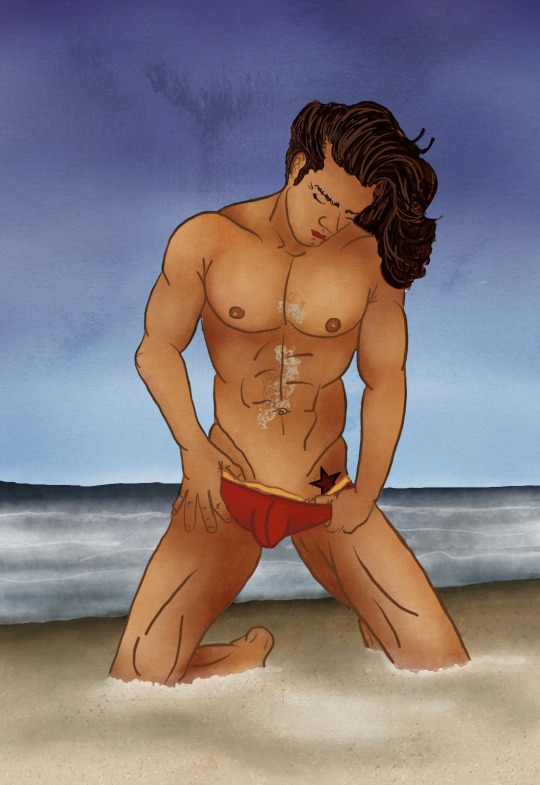
3. Warnings: None that I can think of?
Prompts: Definitely don’t have to stick to this, but this was just what was in my mind drawing this — They’re a Shoulder Angel and Shoulder Demon each trying to do a good job for their assigned Human - Natasha Romanov. I’d love it if maybe they’ve been working together over time to help Natasha (maybe to get out from under Red Room) without actually really seeing each other for a while until eventually they do. Not-Quite-Identity!Porn of some sort, with a bit of oh no he’s hot when they meet. Just imagine the hijinks with a little Nat and these boys as her conscience! Ha!
Limitations: I know Tony is depicted as a Demon here, but this is Tony, please don’t make him out to be the actual Devil? He’s just doing his job but - oh no! - he gets attached to his Human and adversary and only wants the best for them, screw Hell’s policies CLAIMED

4. warnings: none i thinkprompt: Post-apocalyptic AU! Scrappy mechanic Tony meets badass loner and fighter Bucky (with a clunky metal arm)? Maybe some getting to know (and later: trust) each other and surviving (together?) in a hostile world? Trying to make a living?
limitatons and any additional notes: No dubcon/noncon between Tony/Bucky, no sad ending, no super descriptive toture/body horror, Tony and Bucky should survive. Angst/Pain/Suspense otherwise are fine :)The second art is optional. CLAIMED

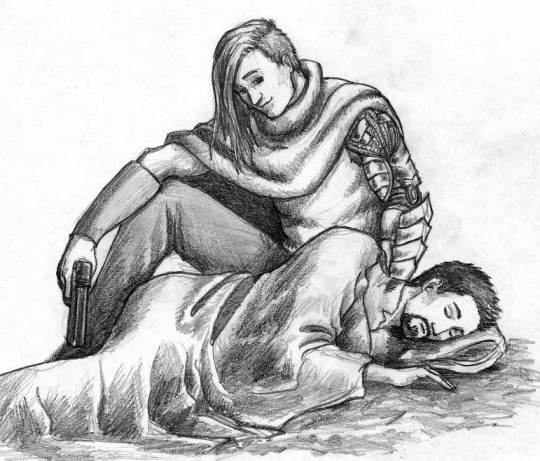
5. Desired collaboration level(s): I would love to be included with the writing/brainstorming process, even just so much as being a cheerleader for it!-Additional details/requests/Prompt: Pre-WI/getting together fic. Wing Au. Maybe something like "Winged beings are discriminated against/unliked/people are nervous of them. Picture scene is: Tony was sitting out in the rain/stuck in the rain, Bucky comes and sheilds him from it with his wing. -Do Wants: Hurt/Comfort, angst is fine too, must be happy ending please, I prefer canon-divergent, but total au is fine too. -Do NOT Wants: Beastiality, Mpreg, A/B/O dynamics, BDSM, D/S verse, Hardcore kinks, Genderbends, Non-con, MCD, underage/age-changes/de-aging, Sad endings!(I would prefer no other/background ships, but can be discussed!) CLAIMED
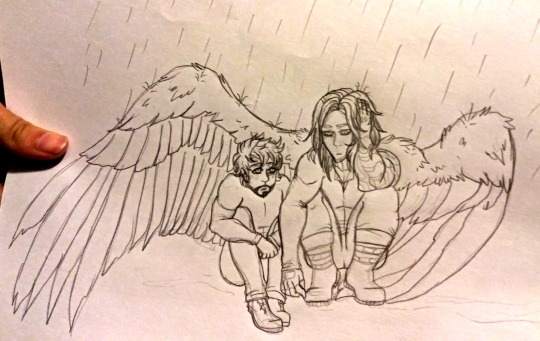
6. Warnings: blood
Limitation: non-negotiable absolutely no Steve Rogers bashing
Wants: OUAT crossover (non negotiable). Jefferson IS Bucky OR Bucky is Jeffersons twin. Steve as a main character as well.
Prompt; Bucky goes missing after a mission, with seemingly no reason. A year later They find Bucky, only he's calling himself Jefferson and crying about a broken hat, and a horrific scar around his neck.

7. warnings: possible gun violence, languageprompt: loosely based on Killing eve "you hired me to kill you!?" "I wanted to see you..." basically, Tony and Bucky (established relationship? Mutual pining? ) haven't spoken in awhile for reasons (are they fighting? Busy? ¯\_(ツ)_/¯) so Tony Hires Bucky to kill him. limitatons and any additional notes: none that I can think of but if you think there's something that could be squicky/a no go, just lemme know. I'm very open to collaboration with my author. CLAIMED
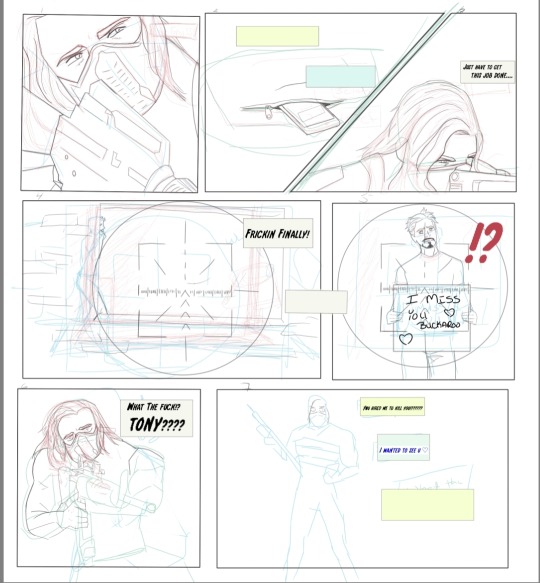
8. No warnings or limitations. CLAIMED

9. Warnings: None
Prompt: Tony Stark meets Bucky Barnes in 1993 and they both fall for each other. One night, Bucky starts to cry. Tony asks what's wrong and Bucky tells him what happened to his parents.
Notes: It really doesn't matter how you end this fic as long it includes some good old fashioned angst! CLAIMED

10. Warnings: noneNotes: Was thinking of a Brookly-99 spin on it, something cute and funny for some feel good happy, but very open to anything really :) CLAIMED

11. warnings: None Prompt: (Description: View is outside of a building. In one window Tony plays the violin. In the other Bucky types away.) CLAIMED

12. Warnings:NonePrompt: (description: Bucky is sitting atop a motorcycle. Tony is approaching him, offering his hand for a handshake. Scene is dusk on an empty road.) CLAIMED

13. prompt: tony is one of the last of his kind (inherited from his mother’s side). he hides his wings from the world, and only pepper, happy, and rhodey know what he is. everything else is canon as per the mcu. it’s up to the author to decide how far in the universe they want to take it, and if they wish to incorporate his wings elsewhere in the series, but tony is iron man and it must be post winter soldier. pre-relationship to getting together.
limitations: please no graphic depictions of rape, suicide, or self-harm (specifically cutting. other forms of self-harm are okay, but please no self-inflicted cutting). no character bashing, ESPECIALLY of steve. no major character death.
things i would like to see: BAMF!tony, ptsd (from either bucky or tony, or both!), a COOL secret reveal, angst, hurt/comfort, and fluff. some smut is okay! i would love if tony keeps the arc reactor. arm maintenance!! please!! tony being terrified of bucky finding out about his wings, and bucky being scared of hurting tony.
relevant notes: tony’s wings are 18 ft (5.4 m) in diameter, and are red and gold. bucky still has hydra arm.
that’s about it! i’m flexible on most things :) CLAIMED
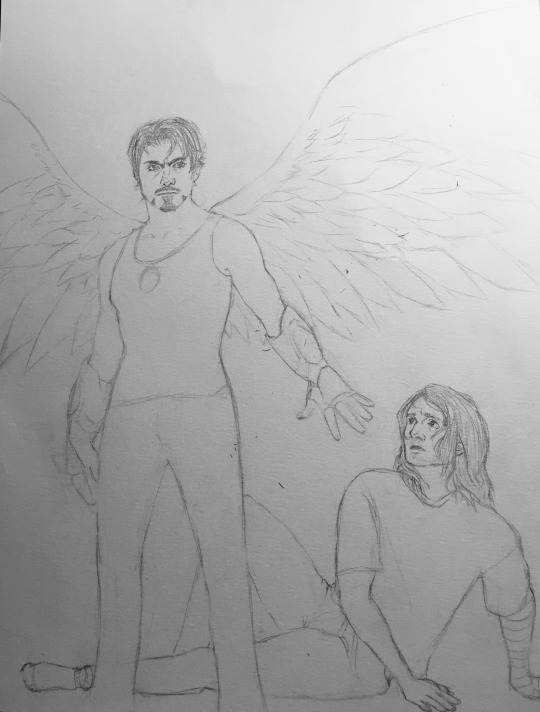
14. Description/Prompt: John Wick AU in MCU
Open for brainstorming or alternate interpretations
Warnings: canon typical violence for story (john wick levels or mcu levels up to author?)
Limitations: DNWs include a/b/o, mpreg, noncon, dubcon between major protagonists, death of major protagonists, unhappy/ bad endings CLAIMED
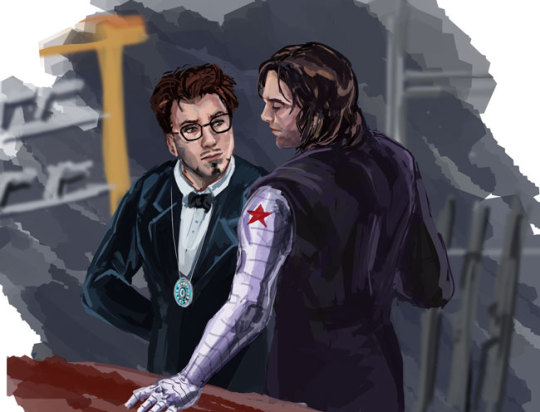
15. Description/Prompt: any frontier myth/ old wild west tropes welcome
Open for brainstorming or alternate interpretations
Warnings: canon typical violence for story?
Limitations: DNWs include a/b/o, mpreg, noncon, dubcon between major protagonists, death of major protagonists, unhappy/ bad endings CLAIMED
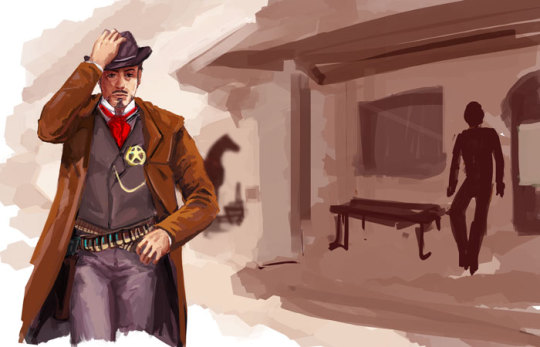
16. Prompt: Romancing The Stone AU. Tony is a tech reliant city boy who is out of his depth in the South American jungle while trying to save a friend. Bucky is the broke traveller who he convinces to be his guide. Adventures and hijinks and a happy ending ensue.
Notes/Limitations: Doesn't have to follow the movie if you're not familiar with it. I don't want Tony to be a damsel in distress that needs to be rescued, just a fish out of water who adapts to his new environment. Any rating is fine, smut is welcome, no character bashing. CLAIMED
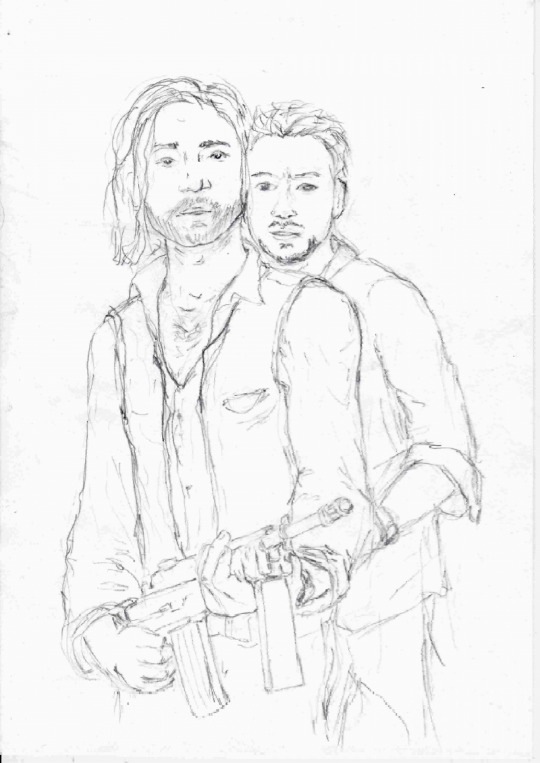
17. warnings: general audiences
prompt: Bucky is part of the Avengers but he and Tony keep their
distance. On a mission Tony saves Bucky from another fall. Later he
asks Tony why he didn't let him slip when he knows he killed his
parents. He doesn't believe Tony forgave him and confesses that he
sometimes hates Steve for not catching him
limitations: no Steve/Bucky/Tony, preferably no Stony, no ABO, no
mpreg, preferably no BDSM or dom/sub CLAIMED
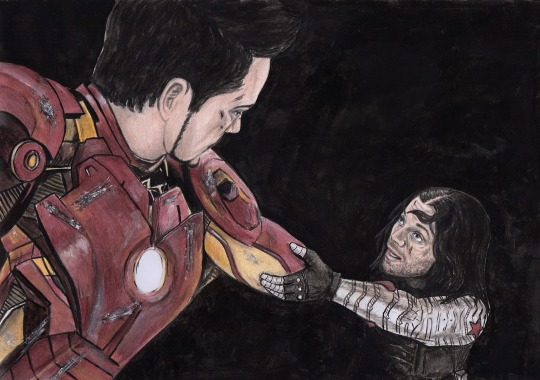
18. warnings: malnutrition, (minor) injuries, shackleslimitations: anything involving children and/or pregnancy CLAIMED
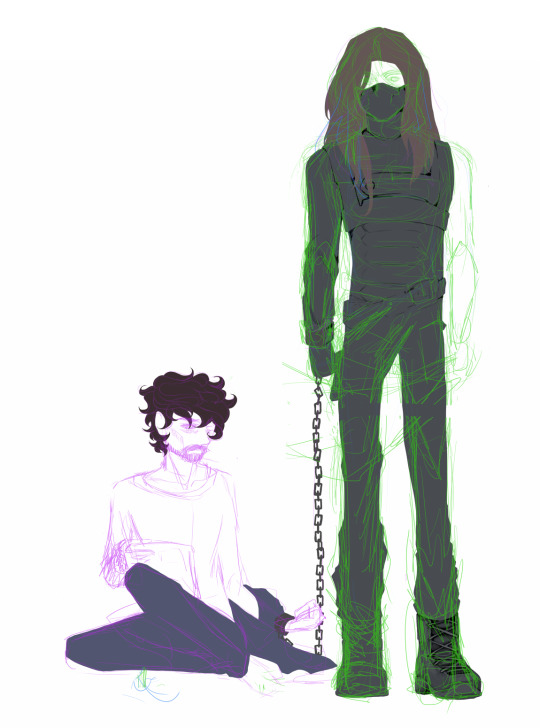
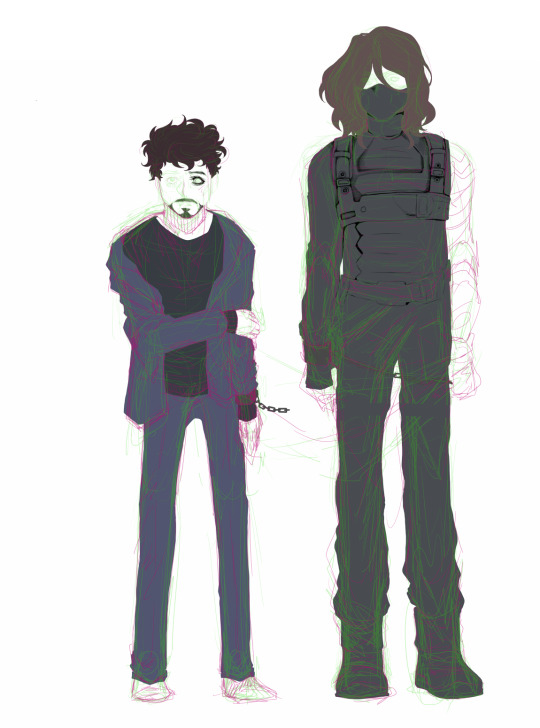
19. Warnings:none
Prompt: Mage Tony and assassin/rogue Bucky.
Limitatons: No major character death, no infidelity, no unhappy ending, Bucky did not kill Tony's parents, would be absolutely fine with graphic sex
Additional notes: Art will have at least one more companion piece featuring Bucky/Winter in Assassin type garb and probably wielding daggers. CLAIMED
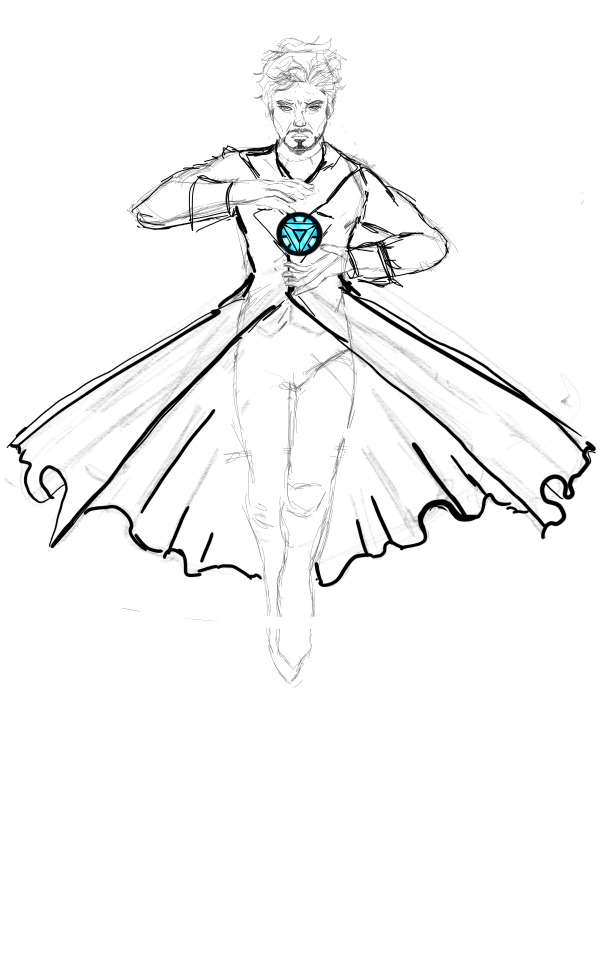
20. warnings: none?
prompt: Dreadful pirate Bucky with a heart of gold!
limitaions and any other notes relevant to the authors for claiming: I'd prefer it if Bucky wasn't actually a bad guy. Go easy on the gore, and please don't do any noncon or dubcon between the OTP. Angst or pain are good as long as there is at least a hopeful ending! CLAIMED
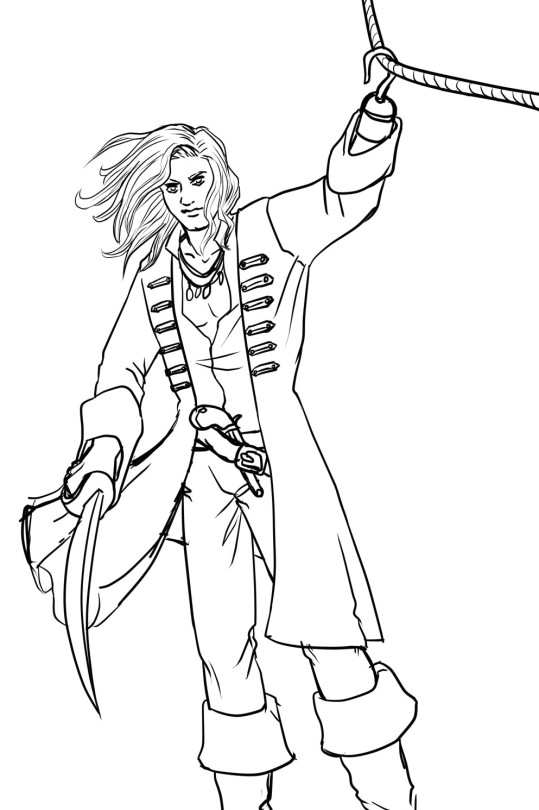
21. Prompt: After the death of King Howard Stark, his son Anthony had to step up to the throne as the rightful heir. James Buchanan Barnes, a knight and new member of the Royal Guard, is sworn to protect his king no matter what. Even if that means protecting Anthony from his own damn feelings. Warnings: N/A Limitations: major character death, terminal illness, homophobia, transphobia, sexism, racism, incest, ableism Notes: Their designs are fantasy-influenced more than historical, and even though I was using MCU as reference, I aged Tony down since canonically Howard died when he was younger anyway! Also the scribble of a background is supposed to be inside the castle, during a party/ball or something? CLAIMED

22. Artist Withdrew.
23. Warnings: None Prompt: The Addams Family AU Limitations/notes: None CLAIMED
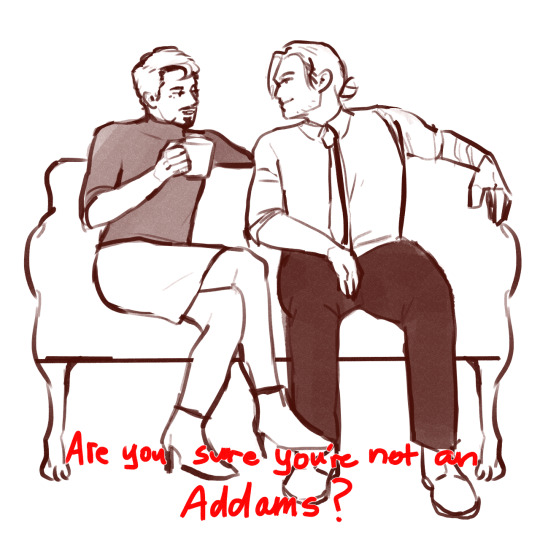
24. warnings: none?
prompt: Warlord Bucky gets a new conquest: Tony. (How? tribute? prisoner? Marriage contract?)
Tony may expect the worst, but slowly discover Bucky isn't so bad...
limitaions and any other notes relevant to the authors for claiming: please no evil Bucky. I like getting to know each other and slowly falling in love. No dubcon/noncon between tony/bucky. CLAIMED
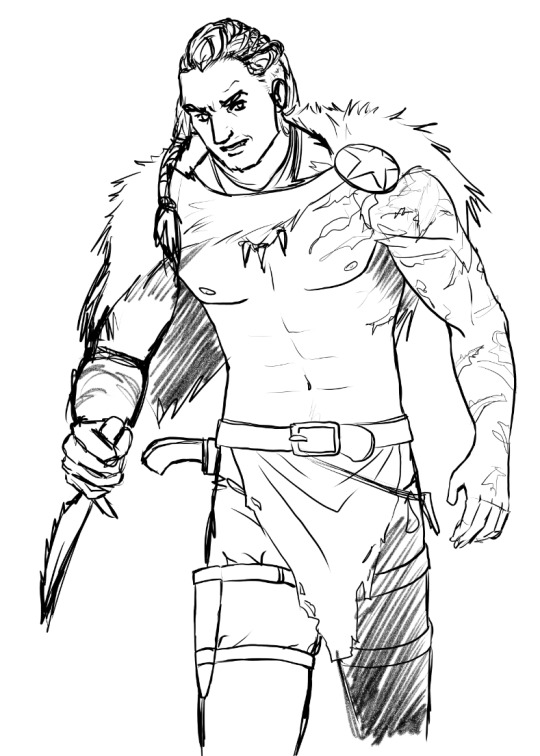
25. Warnings: implied violence, kidnappingPrompt: I went with four comic panels sort of depicting a kidnapping scenario. Bucky (probably) wouldn’t be the kidnapper — i'm gonna try and make him look more surprised in the final draft. Limitations: Go wild. G ratings through Explicit is fine with me. Preferably no M-Preg though. CLAIMED

26. Warnings: None CLAIMED
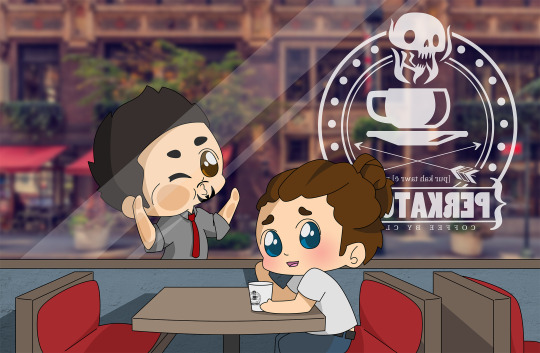
27. Warnings: None CLAIMED
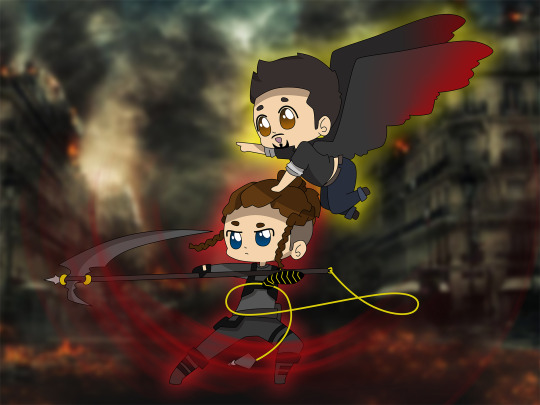
28. Description/Prompt: fluff or comfort?
Warnings: -
Limitations: DNWs include a/b/o, mpreg, noncon, dubcon between major protagonists, death of major protagonists, unhappy/ bad endings CLAIMED
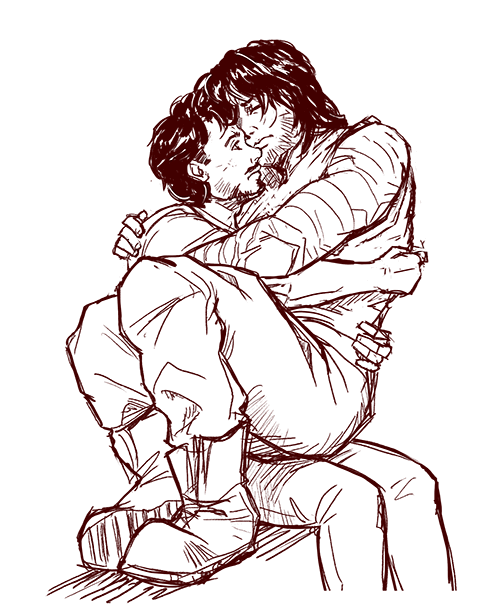
29. Desired collaboration level(s): I would love to be included with the writing/brainstorming process, even just so much as being a cheerleader for it! Additional details/requests/ Prompt: Human!Tony/Werewolf!Bucky. Werewolf au. Do Wants: Hurt/Comfort, angst is fine too, must be happy ending please, I prefer canon-divergent, but total au is fine too. Do NOT Wants: Beastiality, Mpreg, A/B/O dynamics, BDSM, D/S verse, Hardcore kinks, Genderbends, Non-con, MCD, underage/age-changes/de-aging, Sad endings!(I would prefer no other/background ships, but can be discussed!) CLAIMED
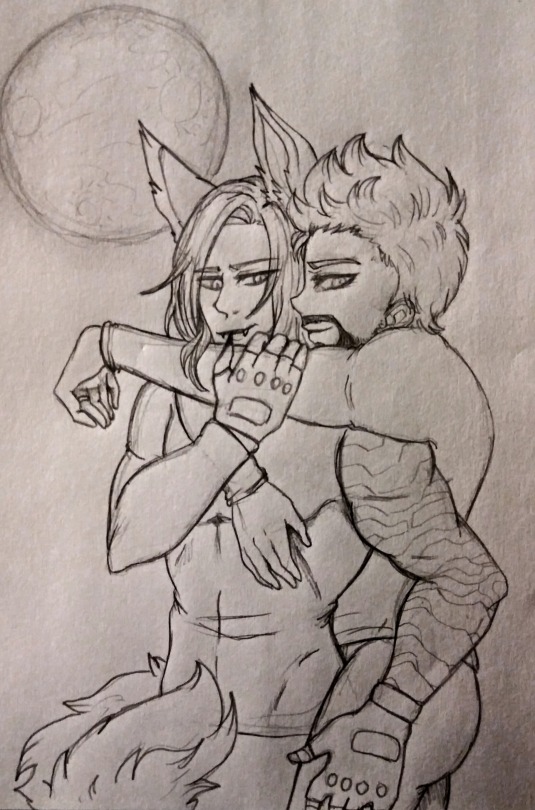
63 notes
·
View notes
Text
A Girl’s Gotta Have Guts
Arakawa once said that a great manga artist is “someone who can find the perfect balance between complying with readers’ expectations and betraying said expectations.” Arakawa seems to employ this philosophy in her own work to challenge her audience’s expectations about gender.
While her stories employ some gender tropes that are commonly present in shonen manga, action stories, and coming-of-age stories with male main characters, she also (whether consciously or not) confronts quite a few clichés and tears them apart with her narrative. By doing this, she subtly encourages her readers, mainly young boys and girls, to challenge the stereotypes about women that they see in other fiction or even in real life.
Arakawa once stated, “Our family motto is ‘those who don’t work, don’t deserve to eat.’ Everyone has to work hard to make ends meet, including women and kids. That’s the reason there are so many working women in Fullmetal.”
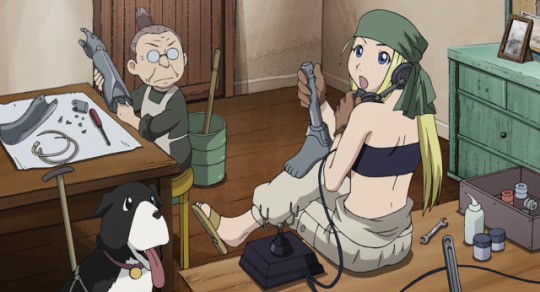
She points directly to Winry and Pinako Rockbell from Fullmetal as an example of this. The grandmother and granddaughter are skilled mechanics who run their own automail business, which the main character of Fullmetal depends upon. Since Winry builds and provides maintenance for Ed’s limbs, Ed owes his mobility and ability to do alchemy to her. The mechanic profession is shown to be male-dominated in Fullmetal, like it currently is in real life, yet Winry thrives in her career and is incredibly accomplished. She even strikes out on her own at age 15 to establish herself in a busier area and have a wider range of customers.
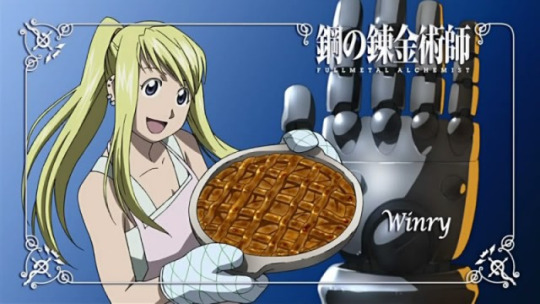
Winry is a tough mechanic but also a very nurturing, emotional person. She’s shown to enjoy baking and be domestically skilled. Since Winry has medical know-how and puts Ed’s limbs back together when they break, in some ways she is in the traditional “civilian healer” role women tend to occupy in action stories. But the work Winry does as a healer is shown to be just as impressive and important as the daring deeds that Ed and Al do, and perhaps even more admirable.

A huge theme of Fullmetal Alchemist is the power to create versus the power to destroy, and as someone who builds new limbs for people, Winry is the embodiment of the former. Winry’s “traditionally feminine” work as a healer is shown to require just as much grit as anything Ed does. A scene where she prepares to deliver a baby in the 2009 Fullmetal anime is accompanied by epic fighting music to underscore this point.

Ed often admires Winry’s skill and ability to save lives. He notes she is able to do what he with his alchemy can’t—bring human life into the world. In many ways, Winry is our protagonist’s hero. She is what he aspires to be—a human who creates rather than an alchemist who destroys. Through Winry, Arakawa challenges the idea that women who aren’t action heroes have less value than those who are.
Giving the Civilian Female Character Her Due:
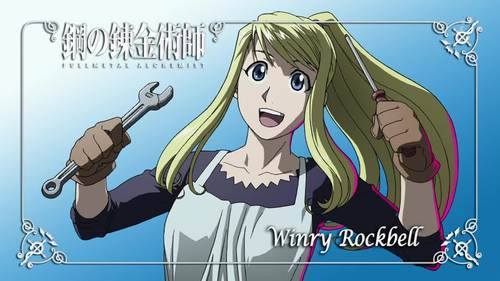
Everyone’s probably familiar with the trope—the superhero’s girlfriend or female relative provides endless support, yet the protagonists don’t ever have to consider her problems. She exists for them, and her life outside them is not of consequence. Not only that, the protagonists don’t see fit to tell her their secret identities, what they’re doing, or even let her in on things that directly affect her (like the threat of villians coming for her). And all for her “protection.” Arakawa presents a similar situation, with the boys depending on Winry but keeping things from her, but then smashes it apart by showing the consequences of treating someone this way. Winry is vocally upset about the boys leaving her out. A huge part of Ed and Al’s character arcs are about how they need to realize that shutting Winry out “for her own good” is hurtful and disrespectful.
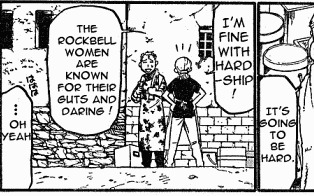
Moreover, it is fully acknowledged that Winry has her own problems to deal with—she struggles with her identity and finding the right path to take in dealing with the loss of her parents. Arakawa makes a point that because of this, Winry can’t just function as constant emotional support without getting any from the boys in return. Arakawa takes great pains to show that while Ed and Al are a big part of Winry’s life, she has a fulfilling existence outside of them. The fact that Winry has her own career, acheivements, and a community that depends on her is what keeps her going.
Essentially, Winry is the hero of her own story. Through Winry, Arakawa encourages her male readers to be more respectful of the women in their lives. She also encourages her readers not to see women as an endless source of emotional healing and support, but as complex people with their own lives and goals who also require support at times.
Promoting the Importance of Emotion and Communication:
Arakawa’s work challenges another common cliché: the idea that it is better not discuss your feelings and that “real men” don’t show emotion. Early on in Fullmetal, a male character tells Winry that the reason Ed and Al don’t talk about their feelings is that “men speak with their actions” and “hide their pain so as not to burden their loved ones.”

However, Winry proves that her way of handling things—by actually communicating her feelings—works a lot better than that macho nonsense. She ends up resolving a conflict with communication. She informs the male character that sometimes you do need to communicate with words, and he agrees with her. Arakawa explicitly shows that the more “feminine” method of being open about your feelings actually gets things done, and that burying your feelings hurts your loved ones more. This is a really good lesson for young people to learn, especially boys, who are often taught to be ashamed of their emotions.
Challenging the Damsel in Distress and Lack of Female Agency:
The “damsel in distress” trope is incredibly common in action stories, especially ones with a male protagonist. A female character close to the hero will be put in peril in order to motivate him. The villain in the story often does this knowingly, seeing the woman in question as nothing but an object to use as leverage against the hero. The narrative will often back the villain up in this—the female character may protest or fight, but ultimately she will fulfill her function as a motivation for the hero. Arakawa encourages her readers to question this particular trope by putting it in play and then tearing it apart. In Fullmetal, the villains threatens the women close to two male protagonists—Winry is threatened to force Ed and Al’s hand, and Riza is threatened to force the hand of her partner Roy Mustang.

However, not only do both women engineer their escapes, they turn the hostage situation to their advantage and save others. It initially looks like Winry has been kidnapped by another faction, only for it to be revealed this was a clever trick Winry engineered to fool her captors and allow her allies to escape. Winry recognizes that her captors see her as a victim without agency and turns this into their downfall. Arakawa even frames the narrative in a way that forces the reader to feel foolish for assuming Winry was helpless. Riza, on the other hand, uses her position as a hostage to gather intel for the resistance.
The most important thing about these situations is the female characters are ultimately put in peril to further their stories more than those of the male characters. Winry’s hostage situation is largely a device to bring her into a confrontation with her parents’ killer, and her story takes center stage during this confrontation, with Ed and Al acting as her support.

Moreover, in taking control of the situation, Winry is finally able to confront her fear of being a burden to her loved ones, resolve her issues with feeling helpless, and even figure out her identity. It also shows Ed’s positive development in that he doesn’t prevent Winry from making her own choices out of a desire to “protect” her.
Source: https://www.themarysue.com/hiromu-arakawa-part-three-women/
#Winry Rockbell#winry protection squad#edward elric#Alphonse Elric#Fullmetal Alchemist#hiromu arakawa#manga#fma
84 notes
·
View notes